#We Thy Monsters
Explore tagged Tumblr posts
Text
So update on that monster fic that probably no one knows about,
Yeah ignore most of the other posts on it I was in the writer insanity zone 💀
Everythings back to normal humans but I am gonna try incorporating the mc's shadow twin ability, but instead of it being a super power its gonna be more of like all her survivor's guilt, trauma and negative thoughts all rolled into one tormenting ghost/metaphor.
0 notes
Text
Obviously, I can't ignore the funny pics of AFO either
AFO getting insulted for the first time on the web be like:
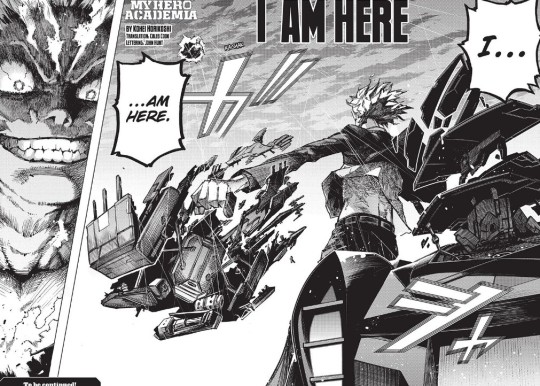
He looks like his fingers would be flying across a keyboard if he were on the internet.
AFO went and made himself into a troll face, man.
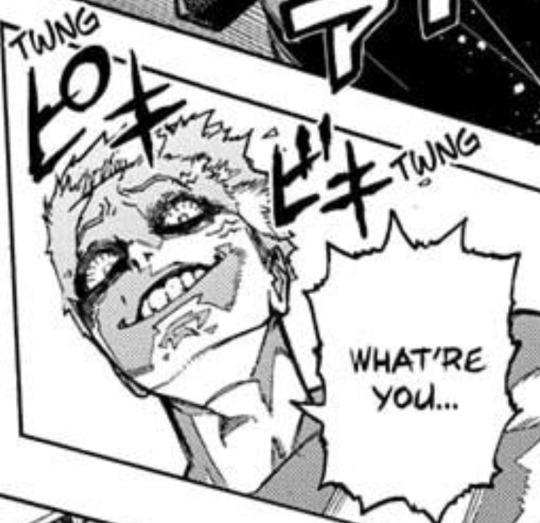

"MOMMY LOOK AT WHAT I FOUND!"
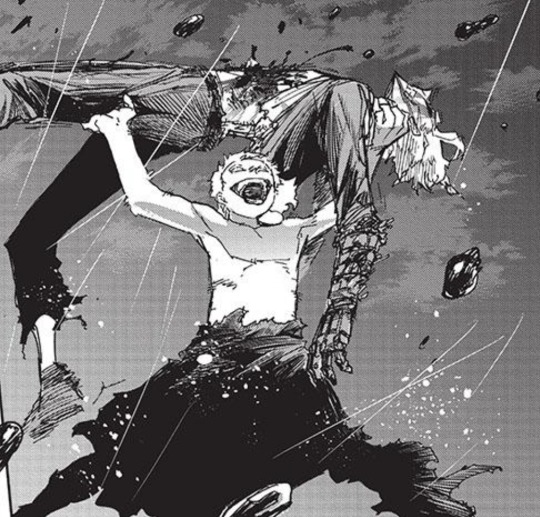
YEAH BOY, YOU LOOK REAL WEIRD BUT YEAH! RAISE YOUR TROPHY
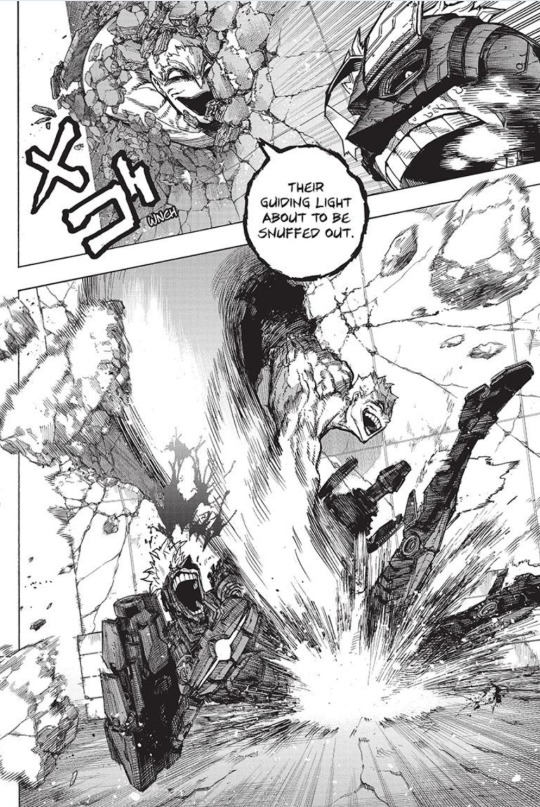
MA! AN ALLIGATOR GOT INTO THE TRAILER AGAIN!
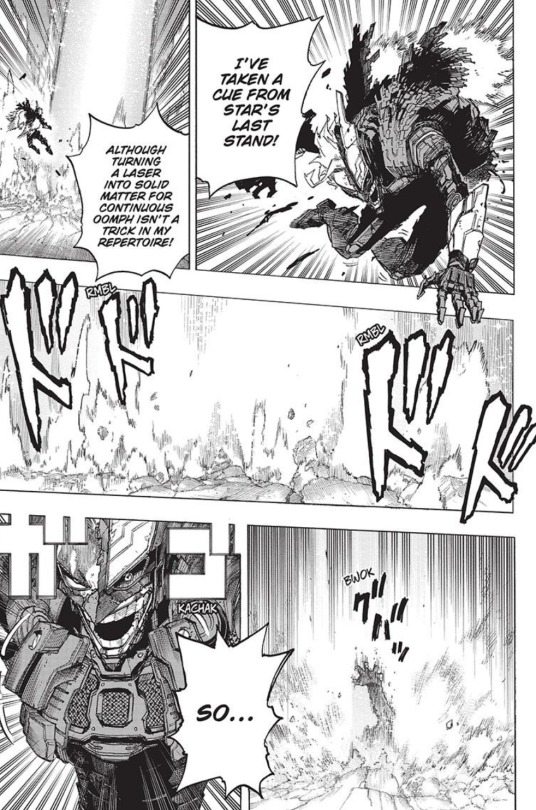
AFO's that arm being pummeled into the ground.
[All Might Doesn't Know How to Fucking Hold Back Against Kids: Case 47]
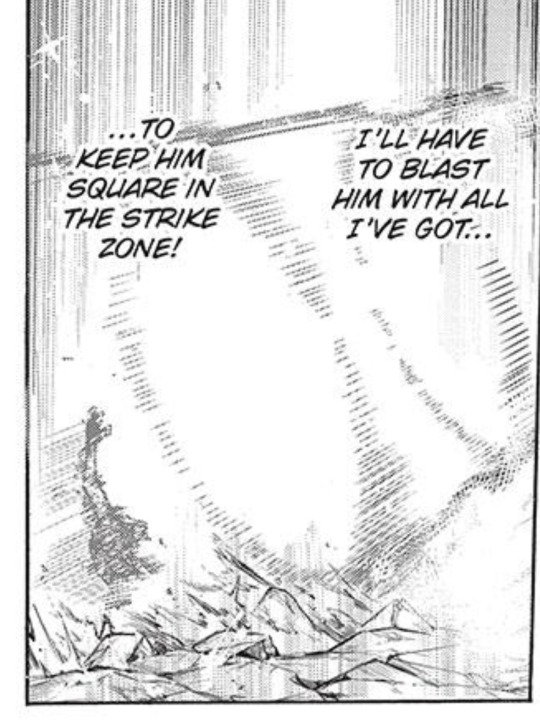
Feat. Accidentally twink-ifying AFO to the point he's become a twig
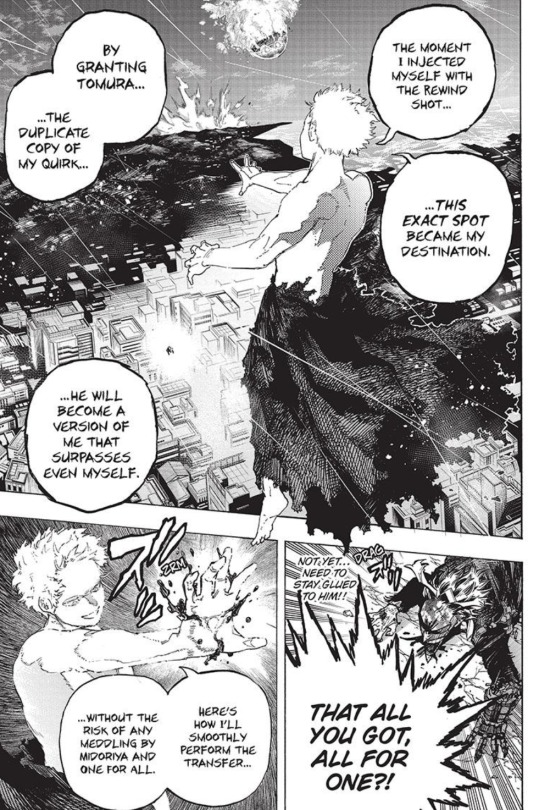
NEWS: AFO fails again, "Desperately trying to play it cool", All Might says, for at least the 3rd time in this fight
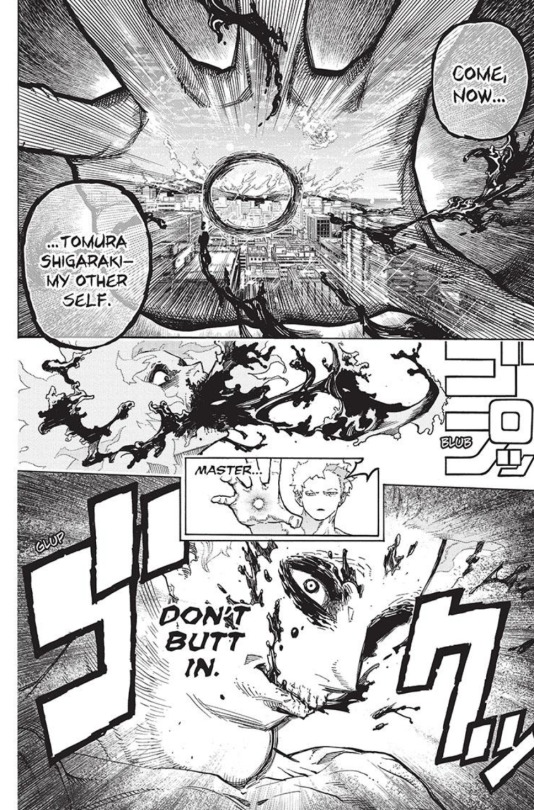
AFO tried being so cool with the "Shigaraki—my other self" and failed instantly. Livestreamed all over the world. Ugggghhh. The embarrassmenttt
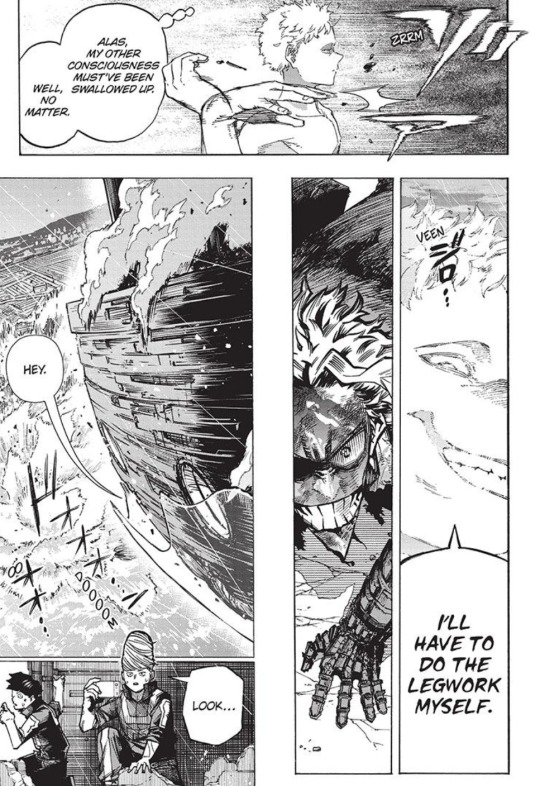
Proceeds to split his face to smile, saying "I'll have to do the legwork myself".
As if to them, he didn't just go "Watch me do this. Come now, my other self. ........ I'll have to do it myself."
"Look how cool I am" *fails* "I CAN DO IT PROPERLY I MEAN IT"
He flip-flopped so hard here that if it were me, I'd give All Might the finishing blow to end me of my embarrassment. The world saw it. My life is over
AFO's ego is just so big and he's trying so hard to play it cool and keep his pride in his fight.
As if he hasn't been running around half-naked in a cape this whole time
#ik ik my sense of humor is bad#the alligator is a monsters inc reference#afo#all for one#bnha#mha#boku no hero academia#my hero academia#all might#toshinori yagi#spoilers#i said in the prev post tags that i wasnt going to stroke his ego#afo is actually a loser (affectionate)#afo: I DIDNT KILL YOICHI.#kudo: yes you did.#afo: *cries and kills kudo*#afo: *hates kudo so much for reminding him that he kills kudos bloodline and goes crazy at someone who looks like him*#afo later: they were crocodile tears so i could manipulate you#afo: *fails instantly on live television* oh well. *tries playing it cool* i'll just do it MYSELF!#yoichi: *dies a second time*#afo: *rises from another death just bc of that* Mine last kin hath been shattered liketh the fine shards that rain of a glass window#afo: gray is thy world that mine brother has departed from yet again. the purpose in life and this plane we call existence hath been#stripped like a nail stuck too crookedly. mother this world hath proven truly unjust and I Shall Throw A World-Shattering Tantrum™#image limit
41 notes
·
View notes
Text
outsider pov was severely underutilized in spn like it's actually criminal the more you think abt it
#we get a few outside pov episodes but babes that's like giving a man two drops of water in a desert#you could probably say smth abt the correlation btwn spn's slow separation from gothic horror into a more sanitized version of itself#with their decision not to lean into their own protagonists weirdness and weirdness abt each other#via depicting them as firmly offputting when viewed at through an outside lens#ouroborous thy name is sam and dean winchester#not sure if i articulated this quite how i wanted but yeah#feel like they kinda talk abt it in the later seasons but the tone fluctuates instead of staying consistently disturbing with it#but maybe that's just the gothic horror girlie in me wanting more from a show that at the end of the day still had to air on cw#smth smth post-apocalypse samdean as frankenstein's monster#sam's s8 relationship w amelia paralleled with the creature's desire for a perfect mate in the absence of his actual true partner#aka dean who was stuck in purgatory and adding a new layer to sam's desire for intimacy#amelia as the theoretical perfect wife who's never realized bc the creature's other half returns#does this make sense idk anymore i need to nap#nothing to see here just my sleep-deprived ramblings into the aether#spn#supernatural#sam winchester#dean winchester#samdean#gencest#weirdcest#wincest#spn rewatch
6 notes
·
View notes
Text
phone? dead
charger? no
i am all alone with naught but my laptop and my wild berry tea monster rehab,,,
#that's not true the dogs are in the hotel room with me and i also have one (1) cinnamon roll and like a quarter of a loaf of bread#and three other monster energies in my bag#and half a pack of smokes but i've already had some#(im at less than half a cigarette per day now not to brag or anything)#but y'know#basically all alone with no connection to the outside world but for my macbook (cursed be thy name)#took me like an hour to get her connected to the hotel wifi#bc for some reason the wifi access login panel just. wouldn't pop up#so it'd be “connected” technically but with no internet access#but the third time i restarted my computer it worked so here we are#all's well that ends well et cetera et cetera#sometimes i reread the things ive written and say goddamn you sound like someone with ADHD who hasn't taken their meds in over a month#but that's only because i am someone with ADHD who hasn't taken their meds in over a month
0 notes
Text
Title: Hiss
Rating: 18+ Minors DNI
Pairing: Messmer x AMAB!Tarnished, Messmer x Male Reader
Warnings: anal sex, the snakes are involved, size difference, barebacking
Author’s Notes: soooo here we are, I wasn’t planning to write a Messmer fic, at least not yet but this idea got stuck in my head and I acted on it, no I will not apologize for using the snakes I’m a shameless monster lover and they’re part of Messmer. Hopefully it’s ok? It’s my first time writing for a fandom other than Mortal Kombat in like 6 or 7 years, I hope Messmer is in character enough. As always likes, comments and reblogs are always, always appreciated!! Enjoy lovelies!
A loud hiss echoes off the barren stone walls, you’re unsure if the noise came from you or from the serpents intertwined in your beloved’s flesh. You bite back a laughably pitiful whimper as you impale yourself on your lover’s pretty cock, Messmer is big, too big and you know it but it doesn’t stop you from trying. Your ass is slick from the demigod’s earlier ministrations and the viscous elixir you had coated his member with before attempting to seat yourself in his lap. Your fingernails bite into the empyrean’s flesh as you sink lower, pain jolting through your back as Messmer fills you deeper than you ever dared to when you played with yourself in the past.
“For one so bereft of light, thy body truly is a work of art,” Messmer praises as his large, strong hands grip your slender hips, stilling your body from swallowing any more of his length.
You feel guilty as you were only able to accommodate a fraction of the demigod’s oozing cock, but with the size difference you both knew it was impossible, Messmer’s body was at least twice the size of your frail vessel. Your cock jumps at Messmer’s honeyed words and you can’t help but moan, “ah my lord,” as you wiggle and writhe in his grip eager to further please the warlord. Reluctantly Messmer relents and lets you take the lead, your heels dig into the cold stone of Messmer’s throne as you slowly lift and lower yourself, trying to find a rhythm to please you both. You let out a breathy cry as the empyrean’s thick cock brushes against your prostate with each movement. You wrap your arms around Messmer’s shoulders, mindful of the little winged serpents hovering there peering at the two of you curiously, as you use his body for leverage to bounce more vehemently.
“Gah,” Messmer groans as more of your slick, tight ass envelopes his huge cock, his mouth hanging slack for a moment before he pushes your hair back from your sweat speckled face.
Your cries climb higher and higher in octave as you keep your steady pace, precum drooling from your dainty, bouncing cock. You wished Messmer would stroke it while you rode him, no doubt you would be able to cum from just the demigod’s cock alone but the pressure would feel so good. You squeal loudly as cold scales wrap around your hot cock and constrict, blinking your eyes open in confusion you look down to see one of the mischievous serpents coiled around your length. “Me-Messmer!” You choke on your words as the empyrean stills your hips and begins to buck up into your tight, silken heat. The serpent slithers in circles around your sensitive length as Messmer assaults your prostate and there’s nothing you can do, your useless legs turn to jelly as you cling to the giant pitifully. You huff and whine and shriek and whimper before big, fat tears gather in your eyes as the serpent’s tongue dances over your sensitive tip.
“Willst thou cum for me my little mongrel,” Messmer taunts you knowing full well you have no choice in the matter, that you were too far gone and all it would take was a little more of the empyrean’s embrace.
“Ah! My lord! Oh Messmer, Messmer!” You wail as your body freezes in place after a particularly pleasurable jolt to your prostate. You hurdle over the edge as the serpent coils tighter, milking your cock as cum erupts from the tip spilling all over the bright red serpent and splashing onto Messmer’s taught stomach. You hear the demigod’s breath hitch as your ass clamps around his cock, spasming wildly as you ride out your orgasm.
“Such a good little culver,” Messmer whispers as he leans down to press his lips to yours to quiet your shouts and cries as he continues to fuck you through your release.
Every inch of you is trembling and alight as you drown in Messmer’s fiery kiss, your pitiful noises mitigated by the empyrean’s demanding lips. Tears still fell freely from your eyes as overstimulation short circuit your brain. You cling helplessly to Messmer as the demigod keeps fucking your dripping hole. You break the kiss to yell as the repeated assault on your prostate pushes you past reason, “please my lord, please,” you plead with Messmer urging him to finish and stop overwhelming your frail body.
“Hush,” he commands as his grip on your hips becomes almost painful as he shifts slightly and pounds into you marveling at your ability to take so much of him. It doesn’t take much long before Messmer’s pace stutters and falters, he squeezes his golden eye shut in pleasure as a cry escapes his lips. His huge body shutters in pleasure as you feel warmth spilling into your tight ass and spreading throughout your tired orifice.
You gasp and tremble as his cum fills you to the brim forcing another pitiful little splotch of cum from your spent cock. You gasp and pant as you try and come down from your high as Messmer slides out and pulls your body flush to his to hold you in his embrace. Your vision is blurry from pleasure and tears as you rest your head just below the rather naughty serpent as it finally releases your cock from its coils, it flits its tongue at you, seemingly pleased with itself. You allow yourself to close your eyes and bask in the heat radiating from Messmer’s body as you coo contently.
The empyrean hums happily as his fingers card through your hair as his cock softens. The two of you stay there for what seems like ages, neither of you in any rush to move, Miquella would have to wait, you would rather watch the world burn than leave your lover’s side. Burn it would, those stripped of the Grace of Gold shall all meet death, in the embrace of Messmer's flame.
#elden ring#messmer the impaler#elden ring messmer#messmer x tarnished#messmer x reader#messmer x male reader#amab reader#amab tarnished#nsft#ns/fw#gay love#gay#drabbles#fanfic#my work#my writing#elden ring shadow of the erdtree#monster lover#messmer
193 notes
·
View notes
Text
Louis + his ways of saying "I love you" to Lestat
"Is this an offer, Louis? Have you come back to me, as lovers say?" His eyes darkened and he looked away from me. "I'm not mocking you, Louis," I said. "You've come back to me, Lestat," he said evenly, looking at me again. "When I heard the first whispers of you at Dracula's Daughter, I felt something that I thought was gone forever --" He paused. - The Vampire Lestat
There was so much I wanted to say to him, to ask him. Yet I couldn’t find the words really, or a way to begin. He had always had so many questions; and now he had his answers, more answers perhaps than he could ever have wanted; and what had this done to his soul? Stupidly I stared at him. How perfect he seemed to me as he stood there waiting with such kindness and such patience. And then, like a fool, I came out with it. “Do you love me now?” I asked. He smiled; oh, it was excruciating to see his face soften and brighten simultaneously when he smiled. “Yes,” he said. - Queen of the Damned
He grew reflective again and very sad. It almost hurt me to look at him. I wanted to grab him by the shoulders and shake him, but that would only have made him furious. "I love you," he said softly. I was amazed. "You're always looking for a way to triumph," he continued. "You never give in. But there is no way to triumph. This is purgatory we're in, you and I. All we can be is thankful that it isn't actually hell." - The Tale of the Body Thief
I came towards him, planted my hands on his desk and looked into his face. "I was so sure you would understand this. And by the way, I wasn't born a monster! I was a born a mortal child, the same as you. Stronger than you! More will to live than you! That was cruel of you to say." "I know. It was wrong. Sometimes you frighten me so badly I hurl sticks and stones at you. It's foolish. I'm glad to see you, though I dread admitting it. I shiver at the thought that you might have really brought an end to yourself in the desert! I can't bear the thought of existence now without you! You infuriate me! Why don't you laugh at me? You've done it before." - The Tale of the Body Thief
"Have you suffered in my absence?" I asked, looking back at the altar. Very soberly he answered, "It was pure hell." I didn't reply. "Each risk you take hurts me," he said. "But that is my concern and my fault." "Why do you love me?" I asked. "You know, you've always known. I wish I could be you. I wish I could know the joy you know all the time." "And the pain, you want that as well?" "Your pain?" He smiled. "Certainly. I'll take your brand of pain anytime, as they say." - The Tale of the Body Thief
I stopped. I put my arm around him. I held him close to me. “I’m Lestat,” I said in a low voice. “Your Lestat. I’m the same Lestat you’ve always known, and no matter how I’m changed, I’m still that same being.” “I know,” he said warmly. I kissed him. I pressed my lips to his and I held this kiss for a long silent moment. And then I gave in to a silent wave of feeling, and I took him in my arms. I held him tight against me. I felt his unmistakable silken skin, his soft shining black hair. I heard the blood throbbing in him, and time dissolved, and it seemed I was in some old and secret place, some warm tropical grotto we’d once shared, ours alone in some way, with the scent of sweet olive blossoms and the whisper of moist breeze. “I love you,” I whispered. In a low intimate voice, he answered: “My heart is yours.” - Prince Lestat
I couldn’t believe I’d heard right. I stared at him as helplessly as I had in the hallway of the townhouse when I’d first seen him, trying to grasp what he had said. He leaned close to me, and he put his hand on my arm. “ ‘Wither thou goest, I will go, and where thou lodgest, I will lodge; thy people shall be my people’; and because I have no other god and never will, you shall be my god.” - Prince Lestat and The Realms of Atlantis
When I was finally led down the stairs, Louis came with me. In the darkened passage before my resting place, he embraced me and held tight to me, his lips pressed to my ear. I was aware of my hands moving over his hair, embracing his neck, drawing him ever closer, in a way I had never done in our long years in New Orleans. We joined in the posture of lovers, brothers, fathers with sons. “I love you with my whole soul, and I will always love you,” he confided to me. “You are my life. I have hated you for that and love you now so much that you’ve been my instructor in loving. And believe me when I say you will survive this, and that you must for all of us. You will survive because you always have and you always will.” - Blood Communion
#long post#this one has been on my drafts for a while may as well post it#Vampire Chronicles#loustat#Lestat x Louis#Louis de Pointe du Lac#the vampire chronicles#quotes#Lestat de Lioncourt#vampire chronicles spoilers
138 notes
·
View notes
Text


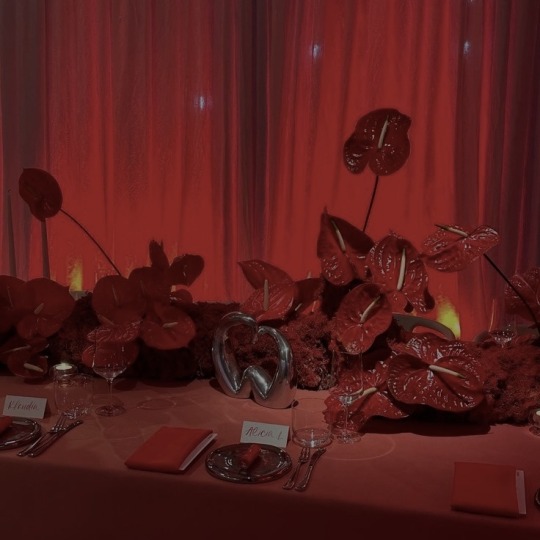

Part 4: The Plan
part 3 | series masterlist | ao3 link
jason todd x f!reader
summary: one step back, one step forward in this dance with jason’s warring desires for intimacy and distance
tags: swearing, UST, light angst
rated explicit (mdni) | wc: 2.7k
a/n: i’ve never experienced an american thanksgiving so all of my knowledge of it comes from pop culture. this is basically the last of my ‘set up’ chapters, so plot + relationship development is going to really hit their strides starting from here.

Jason is learning to live with the thousand pangs of guilt that go hand in hand with his determination to be your friend and only your friend. Guilt churns his stomach so often that it fades to just another background distraction. Every time you stiffen up when he pulls back, every time you try to catch your face before the disappointment can shine through, he sees it all. He should keep his distance, stop reeling you in close before drawing back unexpectedly, but he can’t quite manage it.
A more recent encounter is still seared into his brain. It plays behind his eyelids as he swims laps around the pool with Rei.
The two of you had been heading to the dinner two blocks off of campus after Duvall’s class, the fiery light of the sunset colouring the worn paths across the quad. Class had been predictably… painful. Reading it for his own purposes or for a group of students to discuss, Frankenstein has always struck a raw nerve. I am thy creature and I will be even mild and docile to my natural lord and king, if thou wilt also perform thy part, which thou owest me. Seen and made raw by a woman and her monster years in the past, and isn’t that just the rub? The world spins, new generations live and die and live again to be just as disappointing to the men that created them. Jason’s heart had ached behind his sternum and even the usual balm of your chatter had taunted him with everything he denies himself. He’d made all the right noises, kept his head down and hands jammed into his pockets as the two of you had finally made it to the diner.
“God I almost lost it when what’s-his-name in business started talking.” You’d snorted as you’d opened up your menu, plastic pages clinging together. “Like is it really so hard to have an ounce of empathy? We should start a list of worst takes because that had to be a top five. Jay?” Jason must not have been playing his part well enough because now you’re looking at him, too silent, too caught up on the long stale nickname. “What are you thinking Jay, because I’m thinking pancakes for dinner.” All he could think of is the one and only Dick took him out for pancakes. Begrudgingly. And how it had ended with Dick storming out, suddenly excited about hanging out with the Titans, only to come back disappointed when he had realized he was Jason’s only ride.
“Don’t.” It had come out low and mean, lobbed through gritted teeth like something hot and vicious. Jason had watched it hit you, the way you’d leaned back from the table and hunched your shoulders closer. “Just don’t call me that, yeah?” It had taken concentrated effort on his part to breathe, mimic loosening the tension in his body, to look smaller and non-threatening.
“Oh. Okay, Jason.” Silence had stretched out between the two of you, an almost tangible distance. The words to explain, to apologize and smooth things over had stuck in his throat. The fading light had caught your face for a moment, your face crumpling in hurt before shuttering closed. Your blank face was burned into his mind’s eye just as clearly as all the ways he had not repaired things between you.
Jason surfaces, water sluicing off of his shoulders, before going back under for another stroke. His body takes over the pattern of striking and breathing while his mind returns to the diner. There’s a small animal part at the back of his mind that’s wary of the water. Keeps a small part of him on the look out for any tinges of green to the liquid in the irrational fear that he might also come out of this body of water changed. Actually taking Rei up on his offer to go swimming was in some ways a punishment for Jason, adrenaline thrumming through his veins until his muscles flagged from exhaustion.
Rei is waiting for him at the entrance to the gym, water bottle half empty and lid still unscrewed. His glasses keep sliding down his still damp face but he grins at Jason anyway.
“You sure you’re not looking for a spot on the swim team? Because I’m sure the team captain would get the coaches to make an exception for you.”
Re-shouldering his duffel, Jason asks, “Now why would he do that?”
“I’d do it because I want one last trophy for the relay team.” Rei says wryly.
“No shit?”
“Yeah, I don’t really advertise it because I’ve been doing it for so long that I keep forgetting new people don’t already know I swim. But if you want a spot you’re in. You lapped me like what, four times?”
“Five,” Jason says sheepishly. “Not much of a team player, so I’m gonna have to turn you down.”
“Fair enough,” Rei shrugs. “But I don’t think you’re giving yourself enough credit. You probably dodged a bullet though, the coaches are hard asses about not drinking before meets.”
“Yeah, speakin’ of drinkin’, what the hell was in those drinks you made the first night.”
Rei laughs and the conversation takes a more lighthearted turn as they head across campus to the student union. It doesn’t take much to keep the conversation going so Jason has time to turn over Rei’s invitation over in his head. Jason would never have been able to accept — spackling over his extensive scarring for even just today had been a pain — but it had given him hope that maybe even after all his mishaps with you, that he might still be achieving ‘normal’.
Wednesday comes by and Jason makes up his mind to show up the weekly study session. With the Thanksgiving weekend coming up he’s got less work than ever but an even stronger desire not to be alone. Campus has emptied out in anticipation of the long weekend, the student union almost echoingly empty. Lina and Rei are already taking up a bench, sickeningly affectionate and dodging the balled up paper scraps Danika is tossing at them. You sit next to her, rolling your eyes at her antics then egging her on whenever Lina swoops in to leave another lipstick stain on Rei’s cheeks. He hesitates before committing to the seat at the end of the table nearest to you. The fresh loukoumades burning a hole in his bag will have to be shield and apology enough.
He’s nearly there, three feet out from his target, when the sound of a chair getting angrily out of the way diverts his attention. Will is dragging his bike through the field of chairs, cursing up a storm that has even Jason with all of his years in Gotham taken aback. Quite possibly its the most words Jason’s heard Will say out loud in the scarce months he’s known the man. The incongruity of the scene with who Will generally is as a person sends most of table into nervous half laughter.
“Will? Will what’s wrong? The biking parking finally full or something?” You ask, disbelieving.
“What the fuck does it look like?” He snarls, before throwing the bike to the ground in frustration.
“Hey—“
“Will, what happened?” Lina cuts Jason off, uncurling herself from around Rei and leaning forward. Her eyes are wide and searching, and in Jason’s opinion, not suspicious enough for the uncharacteristic rage on Will’s face.
“Some motherfucking cock sucking moron nearly ran me off the sidewalk in their piece of shit gas guzzler. That’s what happened.” He goes to throw himself into the seat next to you but Jason beats him to it, larger frame boxing him out. Throwing Jason an annoyed glance, Will slouches into the only seat left. He brandishes his coat clad arm in front of Lina and Rei, still thrumming with pent up energy.
“Look what they did!” He exclaims.
“I don’t think any of the bandaids in my bag are big enough for that scrape.” Rei says regretfully.
“What— never mind the scrape, look what they did to my coat!” He pulls the fabric tight across his wrist, shoving it under their noses. Rei and Lina give each other confused looks over Will’s head.
“There’s a lose thread?” Questions Danika.
“Yes! Thank you, yes! That idiotic jackass made me scrape up my Loro Piana jacket, do you know how much this costs?!”
“So,” Danika interjects, “won’t your family just buy you a new one and write this off for taxes or something?”
“That’s not— okay that piece of shit not only destroyed my jacket and put my life at risk but he’s also polluting with his mid-life crisis pollutant puker. You know there’s a reason Gotham ranks worst in pollution for cities in New Jersey? It’s thanks to people like that who don’t care that their cars are leaking oil and going knocking people — who are just trying to be nice to the environment — off of their bikes when they were just minding their own—“
“Report it to the police or campus security then.” Jason interrupts, before Will can get into the rant he’s building up steam for. “You got close enough to see the oil leaking, you probably saw the license plate too.” Jason pulls the loukoumades out of his bag and slides them over to you, keeping eye contact with Will the whole while. Will breaks eye contact first, pulling his perfectly intact black wool coat tighter around him before shoving his hands deep in the pockets. You’ve cracked open the container and let out a hum of delight. Will’s eyes dart to the table.
“Didn’t get it. How was I supposed to know that one minute I’d be riding along, and then the next I’d be traumatized for life by some inconsiderate brute?” He sulks. And oh, yeah, not everyone had grown up with B and all of his lessons on paying attention to your environment for evidence.
“Yeah, speaking of trauma, who’s got plans for thanksgiving yet?” Danika asks, mirth and humour her weapon against the atmosphere.
A sharp elbow knocks once into Jason’s ribs. He turns to look down at you, hoping your bid for attention won’t turn out to be disappointing. You meet his gaze with cheeks stuffed full of fried dough and honeyed syrup, eyes narrowed and considering.
“They’re not pancakes, but I thought you’d like ‘em anyway.” Jason says.
You swallow, before beginning to speak in a low voice, letting the flow of conversation continue around the two of you undisturbed. “If this is an apology, there better be more from where that came from.” Your small lopsided smile is sincere, but it doesn’t quite erase the image of your blank face from the dinner from his memory. Nodding, he goes to pull out the second Tupperware container that he’d had the foresight to prepare and you begin to lick the leftover syrup from your fingers. Jason’s vision narrows down to your thumb and forefinger, glistening in the fluorescent lights. He could swear his heart skips a beat when your pink tongue flicks out, his breathing certifiably irregular when you start to suck on your fingers. The image of your lips shiny from syrup will probably be engraved on his second headstone as the cause of death.
“—son, Jason.” Danika’s voice, high pitched and insistent, breaks the moment. He’d be embarrassed at tuning out his situational awareness if he wasn’t also scrambling to answer her half-heard question.
“No plans for me. My family and I aren’t really in a ‘gatherings and gratitude’ place right now.”
“Whoops, we’ll add your family to the off-limits list. What do you usually do then?”
Your phone starts buzzing, and you swear under your breath as you navigate sticky fingers and tight jean pockets.
“I just make a fancier meal than normal, watch the parade on the tv. Not much to it.” He replies off-handedly. He doesn’t mention the extra patrols he’ll do, in anticipation of one of the Rogues deciding to make a splash across holiday headlines.
“Sorry, I’ve got to answer this.” And already you’re trying to climb over Jason to get out from the booth and away from the table. It brings your face closer to his than it’s ever been and Jason would be trying to pin a name to the exact shade of your eyes if it wasn’t for the worry on your face. The nearly empty building means that you don’t wander far from the group. You pace as you listen to whoever is on the phone and play with the charm on your necklace. Will catches on to Jason’s line of sight and rolls his eyes, still sulking in his chair.
“So there’s a whole list, yeah? Things you don’t talk about?” Jason asks, trying to distract himself.
“Oh I wouldn’t call it anything so official.” Lina dismisses.
“No but we totally should!” Fires back Danika. “It would make things sooo much less awkward if Jason knew not to bring up just how much money Will’s rolling in, or the fact that Rei hates talking about the team right before a swim meet, or that when she,” and here Danika lowers her voice and nods in your direction, “plays with her necklace on a phone call fifty bucks says it’s someone from her family.”
“Got it, no askin’ her about the secret phone calls.” Jason says with a tight smile.
“Oh it’s nothing super secret.” Danika leans back into the corner and waves a lazy hand. “Just that most of them were dead set against her doing English instead of some ‘useful degree’ like pre-med or engineering. Don’t know why though, I don’t think’ I’ve ever met anyone that hates calculus more.”
But Jason, Jason thinks he does know why. Puts together the little pieces of your past you’d entrusted to his scarred hands and looks to the shared weft of your past. Looks at a girl whose family had scraped and fought to make a life untouched by poverty in a city that doesn’t easily forgive, and knows that it took luck and bone wearying effort to make it out of the Alley’s clutches. He looks at the girl who is used to being told her opinions don’t matter and yet believing in them anyway, who has put together a path leading right to her dreams even if the detours take her back to the place her family was happy to leave behind. Jason looks around the table at these fresh faced kids in their $6000 jackets and knows that none of them understand the constant, cavernous fear that all of the little luxuries they take for granted will suddenly disappear like morning fog. Jason knows the kind of courage it takes to push past that dogged fear and refuse the path your family pushes you down in order to achieve loftier goals.
The conversation has moved past him now, wrapped in his reverie. Rei and Danika have devolved into the kind of hardline negotiation Jason would have expected to see between seasoned lawyers rather than undergrads.
“C’mon Danika, I know you want a Pinterest worthy friends-giving but it’s just not going to work out this year.” Rei chides. “There’s just no time that’s gonna work for all of us.”
“Yes but it’s our last year when we’re all for sure going to be in the same place for the holiday weekend!”
“Look, we should all be free the Friday after the long weekend. We’ll do another night out, me and Lina will host the pre, and it’ll be our version of friends-giving. I’ll even make turkey themed cocktails if you want.”
“Gross! Fine, fine.” Danika most definitely does not whine. “But make them pumpkin pie themed cocktails instead.”
Jason’s got half an ear on the conversation, but continues to study you as long as his input isn’t needed. You sigh and seem to deflate as your call ends.
“So boys, are you ready to see the damage Rei can do when he’s got his full bar cart with him?” Lina asks, coy as anything. “I’m sure he’ll be able to make something that will even get you dancing, Jason.”
You shuffle around Jason, trying to squirm back into your bench seat. For a brief moment, your thighs bracket his.
“If that’s the plan,” Jason breathes out shakily.

Part 5
#jason todd x reader#jason todd x you#jason todd x y/n#jason todd x fem!reader#red hood x reader#red hood x you#jason todd fanfiction#jason todd fic#red hood fic#ydcmb (uibyt) series#sunnie writes 🌻
125 notes
·
View notes
Text
Love Thy Husband
Kingpin's Son!Choi San x Chubby arranged wife! Reader

I:Love Thy Husband- II: Bring Me Home
3 month later …In the heart of Namhae-eup..
Average as any other day, from the time you open your eyes and step out your room, your husband is missing, drowning you in eerily silent yet you feel relieved not having to be under his watchful eye. Bathtime it is then…Where does he go this early ? It’s 7:00am.
You fell into deep thought as the steam filled the bathroom and the running water acted as soft background ambience. Did he eat before he left?… Why do I care if he’s eaten it’s not like he gives a hot damn about me….the only time I get to leave is for “outings”. I’m arm candy, luckily, my veil isn’t great when it comes to eye contact and keeping conversation.
Your “wedding” came to mind~
The abrupt chime of the wedding bells sealed your doom. It was time to go. The heartbreaking realization felt like a jab in your chest, weakening you to your knees. In that moment, the hot tears streaming down your cheeks were impossible to hold back.
Your sorrowful whimpering brought your mother to your side, whispering words of encouragement and warmth. Yet, her comforting words only deepened your sadness within.
Your husband's mother even came over peacefully, expressing remorse and apologizing for her husband's actions. She knew she wasn't your ally right now, but she assured you, "San is a good boy. He wouldn't lay a hand on a woman if he knows what's good for him."
The sudden, warm grip beneath your arm startled you into stillness. "Are you alright?" His deep voice sent shivers racing up your spine. "We need to go." His voice started to irritate you, you know its not his fault he’s just following his monster of a father’s orders but you can’t help blaming him in some way out of bitterness since he appears to be content in his father’s choice.
“ Yn? I can carry you-“ San’s sweet offer was met with violence as you swing your gloved hand almost whacking him if not to his quick reflexing, his eyes shift from his large hand caging your tiny one back to your “face.”
San's brow furrows, his expression a mix of concern and self-reproach. This wasn’t his fault—he’s in the same boat as you, and yet he’s been nothing but a perfect gentleman since the moment you met just hours ago. And now, you dare to raise your hand towards him, or at least try to.
A flicker of amusement dances in his eyes—cute. With a delicate pinch, he catches the edge of your veil, playfully flicking it over your face. The harsh pink of your teary eyes and the soft curve of your nose tug at his heartstrings, though his expression remains stoic.
You gasp, clutching his arms as he effortlessly pulls you to your feet once more. "We have to go now, I’m sorry to rush you, sweetheart." His words come out in gentle, hesitant beats, each pause a reminder that English isn’t his first language. You wonder, fleetingly, what was.
Before you can respond, San steals a glance at his watch, then swiftly scoops you into his strong arms, cradling you against his chest as if you weighed nothing at all.
You crossed your eyes, annoyed by the warmth in your cheeks where your memory began to fade. He’s strong..I will give him that..
…
The bubbles melt away your worries expect for one. I mean it’s not really a problem if I think he’s cute. He is my “ hubby”….after all and I’m not even sure of what I saw . The small creaking in the floorboards was drowned by your soft music and humming. Meanwhile on the another side of the walls, San grunts as his back hits the top of the stairs,
Exhausted, your husband collapsed on the stairs, struggling to catch his breath. "Damn it, I really need to piss!" he groaned, throwing his head back in frustration, only to smack it against the step above.
"Ack! That hurt!" San hissed, rubbing the back of his head as irritation bubbled to the surface. Every little thing around him seemed to get under his skin, as if the entire world was conspiring to push him over the edge. "Why is everything so damn aggravating?" he muttered, the annoyance palpable in his voice.
In a surge of pure, unbridled fury, San slammed his fists into the wall, leaving a couple of gaping holes behind. The force of his anger also tore a large chunk of the railing from its mount, sending it crashing to the floor.
He stood there for a moment, seething, as his father's words echoed in his mind like a relentless drumbeat—orders and expectations suffocating him like a noose. Nothing will ever be good enough for him.
San's tie was the final straw, its constriction around his neck driving him to the edge. With a frustrated growl, he yanked the fabric down, as if tearing it away could somehow relieve the tension coiled inside him.
"When that girl bears you a son, you'll understand, my boy," his father had said, his voice dripping with a sincerity that only fueled San's anger. The words, meant to console, did nothing but fan the flames of his rage.
The unsettling sensation of being watched prickled at San, prompting him to glance over his shoulder. His eyes locked onto his wife, who was timidly peeking around the corner. The sight of his bare chest, revealed in his frustration, brought a flush to her cheeks as she took in his stunning yet indecent display.
In the blink of an eye, she vanished, the bathroom door slamming shut behind her with a force that echoed through the hall. Poor San stood there, his hand dropping awkwardly after she blatantly ignored his small, hesitant wave.
Rude, perhaps, or maybe she was frightened—of what, he couldn't fathom. His gaze drifted to the wall, and suddenly, his breath hitched. The sight before him was shocking: the rail piece he had been holding now lay on the floor, a victim of his accidental brute strength. "Oh," he muttered, his eyes wide with realization, "Oops."
Meanwhile, on the other side of the bathroom door, you felt trapped. His broad frame was blocking your only exit, and he was standing so close to the stairs that you knew there was no easy escape. Your room was upstairs, and you silently cursed yourself for choosing to use this bathroom instead of the one safely tucked away in your own space.
Taking a deep breath to steady your nerves, you finally summoned the courage to swing the door open. But as it creaked on its hinges, there stood San, closer than you anticipated, his presence filling the doorway.
San, his expression softened with concern, the tension between you palpable yet oddly comforting. His presence was overwhelming, but not in a suffocating way. It was as though the air around him carried a warmth that you hadn't noticed before, a gentle calm that contrasted sharply with the turmoil in your chest.
"I'm sorry if I startled you," San's voice was deep and soothing, a hint of apology lingering in his tone. He stepped back slightly, giving you the space you so desperately craved yet somehow didn't want anymore. His gaze never left yours, filled with an unexpected tenderness that made your heart flutter.
You exhaled, your shoulders relaxing slightly as you took in his sincere expression. "It's okay," you replied, your voice barely above a whisper. "I just… wasn't expecting anyone."
A kitty.He looks like a cat. It feels like it’s been years since you’ve seen his face, his sharp eyes and glare give off a harsh aura despite his words and soft tone. Was it on purpose? You found it difficult to keep eye contact without getting flushed from his eyes but looking down at his exposed chest was a whole other problem. His whole handsome face is the problem, honestly.
"You're even cuter without your heels," he muttered, a sly grin playing on his lips as he took in how your smaller frame matched up to his. His eyes, though mischievous, stayed fixed on your face, a feigned act of respect, even as he relished how the flimsy white cloth clung to your plush curves, teasing him mercilessly. " I have to use the bathroom." He nods behind you.
You moved, swiftly out the way gripping your towel, allowing him to waltz into the bathroom.
He knows you like the difference between you and his bathtub, but this is the first time he's walked straight into the refreshing cloud you left behind. The sweet scent matched your soft body as you brushed past him, turning to close the door, but you were already long gone upstairs.
You gripped your towel tightly as you slid down the door, your knees weak beneath you. The embarrassment of being caught in such a state burned in your cheeks.He's even more handsome now than he was three months ago. It looks like he's been working out... I can see the definition of his muscles beneath his shirt.
The small scene replays in your mind, of him towering over you, yet you notice how he steps back, careful not to startle you. He's got this undeniable sass about him.. You notice his large hands resting on his hips and realize that his dress shoes have a slight heel, which clicks softly against the wooden floor.
Your heart skipped a beat hearing San's door close. You decided you definitely needed more fresh air, leading you down the road you're on now.
While you were enjoying yourself, you didn’t notice that you had triggered the house security alarm. Luckily, your husband was so sleepy that it went unnoticed for a full hour.
To make matters worse it wasn't your husband who discovered the alarm but his elders deciding on a surprise visit.
"San. San! Yah! Choi SAN!"
Talk about a rude awaking, Hongjoong Hyung sat in a lounging chair in the corner of the room, his left foot was extended before he crossed his legs. A strong jolt shook the bed, awaking up your tired hubby.
San groaned before looking at his elder who was simply unimpressed. "Hyung?.." He stretched his remaining remnants of his drowsiness. " What are you doing here?" He hung his head low as he spoke from tiredness? Or respect?
Seonghwa’s voice crashed like a thunderclap, delivering the news the elders had long dreaded, since they were notified about the house alarm that screamed through the home. "She’s gone." His deep voice words tore through the now thick, pregnant silence between Hongjoong and San. San’s chest tightened; enduring one scolding was enough.
Yet, only a fool would believe that Hongjoong's shadow was far behind.
"She's gone?!" San shot up from his bed, fully dressed despite his rumpled state, his eyes wide with disbelief. 'Are you serious?!' In an instant, he was out the door, leaping over furniture in his desperate rush to the front. The elders' voices called after him-
"He forgot his shoes," Seonghwa muttered, as he and Hongjoong stood outside, watching San disappear from sight, completely clueless about where he was headed.
Hongjoong clicked his teeth before stating." He forgot his common sense too. He's just running in a direction. Ah shi-" He then quickly raised his phone to his ear. " Yunho. We need a inner search party keep it under wraps from Choi senior. Clear?"
A firm 'Yes, Sir' ended the conversation as the line went dead immediately after.
…
To be continued..
#ateez yunho#ateez scenarios#ateez x chubby reader#ateez imagines#ateez x reader#ateez x y/n#ateez hard hours#chubby reader#choi san series#choi san x chubby reader#choi san scenarios#choi san fanfic#choi san x reader#choi san imagines
127 notes
·
View notes
Text
Eternal Punishment: Ideology, Performance, and Martyrdom as Sunday's Expressions of the Death Drive
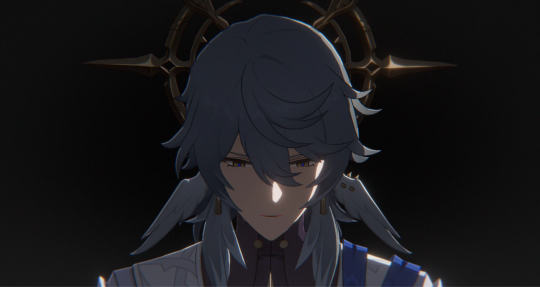
“Sleep sleep happy child. All creation slept and smil’d. Sleep sleep, happy sleep, While o’er thee thy mother weep” -William Blake, “A Cradle Song,” Songs of Innocence and of Experience “So, where is my dream?” “It is a continuation of reality.” “But where is my reality?” “It is at the end of your dream.” -The End of Evangelion (1997)
Considering the majority of his development occurred in Penacony’s third act, Sunday has proven himself as a compelling antagonist who rivals both Takuto Maruki (Persona 5 Royal) and Kevin Kaslana (Honkai Impact 3rd) in grandiosity and pessimism. Although his motivations and methods closely resemble theirs, the tragic path that led Sunday to his rigid belief system began when he was still a child and is intimately related to his experience with family. Having both witnessed the suffering of others and experienced it himself, Sunday’s ideology was born with a single purpose: to shelter humanity from the pain of reality. His answer to life appears rational on its surface and is constructed with kind intentions, but in practice it would have damned the cosmos to a purgatorial world of constancy and doomed its creator to infinite loneliness. It is this tension between Sunday’s intentions and the truth of his actions that fascinates me, because it reveals a deeper conflict within him that is also at the center of Penacony’s story. Here, I’ll use some of Freud’s psychoanalytic theories to illustrate what exactly that conflict is, and why it’s so important for a full understanding of both Penacony's finale and Sunday’s arc thus far.
Cohesion not guaranteed, my brain feels like swiss cheese after 2.2
Spoilers for the entire 2.2 Trailblaze Mission (In Our Time) and a small post-quest with Robin (The Feather He Dropped).
Disclaimer: All content in this post, especially the psychoanalysis, should be taken in the spirit of media analysis and nothing more. Also, corrections and additions are welcome, whether they are about interpreting Freud or HSR. :)
To cut down on post length, external sources (that is, any reading that is not official Star Rail material) are given as numbered in-text citations and gathered in a pastebin document linked at the bottom with the full title and exact page numbers of the source.
And before we begin, a huge thank you to my boyfriend for proofreading this numerous times despite not having played any Hoyoverse games, and for talking out the philosophy with me T_T That’s love right there!
Penacony, Freud, and the Occasion for the Death Drive


“The IPC does not care about its workers! I bet you they would love it if those monsters came and killed me. That way they wouldn’t have to pay for my pension!” “Sounds like somebody could use a Sprinkles cupcake!” -It’s Always Night in Penacony Show
It is impossible to avoid Sigmund Freud when discussing the psychology of dreams, and his psychoanalytic theories are tightly woven into nearly every aspect of Penacony’s environment and story. Our most salient point of entry into his work is The Family’s sweet dream, which embodies the base instinct in human nature towards pleasure-seeking behavior and instant gratification, even at the expense of self-preservation, also known as the pleasure principle.¹ Be it slot machines, luxury cars, decadent food, or endless shopping malls, everything in the sweet dream exists to further each guest’s pursuit of pleasure—such is the purpose of dreams, Freud theorized, as vehicles for wish-fulfillment.² “Death,” let alone pain, is not allowed to exist in the sweet dream in order to preserve that pleasure:
“A further incentive to a disengagement of the ego from the general mass of sensations–that is, to the recognition of an ‘outside’, an external world–is provided by the frequent, manifold and unavoidable sensations of pain and unpleasure the removal of which is enjoined by the pleasure principle, in the exercise of its unrestricted domination. A tendency arises to separate from the ego everything that can become a source of such unpleasure, to throw it outside and to create a pure pleasure-ego which is confronted by a strange and threatening ‘outside’” (Freud, 1930, p. 4).³ “One of the twelve Dreamscapes in Penacony, and its time coincides with midnight. Here, the dream's time is forever stuck at 00:00. Tomorrow will not come, and this night of revelry will never end” (Loading Screen: Golden Hour). Gallagher: …Think about this — what would it cost to create and maintain such a lavish dreamland? Gallagher: It's people's lives. The opulent dream is built upon the decay of spirits, with a toxic elixir called "pleasure" flowing through the Dreamscape. It tempts people to indulge in the Dreamscape, and gradually their minds succumb, becoming nourishment for the sweet dream. (The Public Enemy)
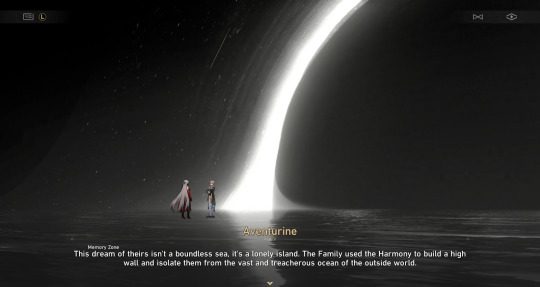
Aventurine: This dream [Memory Zone] of theirs isn’t a boundless sea, it’s a lonely island. The Family used the Harmony to build a high wall and isolate them from the vast and treacherous ocean of the outside world.
But “death” still lurks beneath the juvenile fantasy and its sweet commercial lies, in the yawning chasm proceeding spiritual death. This space, the Primordial Dreamscape, is a chaotic rendering of memories and emotions that goes beyond consumerism as the ultimate form of pleasure, and the high walls of the sweet dream separate each “Moment” from its depths. It is the original form of the sweet dream, its primitive reflection in the Memory Zone’s water, and the crystalline bodies of its memetic entities are like mirrors into the past inviting guests’ introspection.
Introspection is the Achilles’ heel of The Family’s superficial paradise, because curiosity about oneself redirects the ego’s interest from external objects to the inner abyss of thoughts and desires deemed unacceptable in reality, and remembering their existence reveals psychic pain. The Family’s denial of these ‘impure’ thoughts reflects the process by which the ego represses instinctual impulses to avoid that pain:
Robin: While I was away from Penacony, the boundaries of the Twelve Dreamscapes kept expanding outward. But whenever I mentioned the anomalies in my dreams... all The Family heads refused to talk about it. Only my brother was willing to respond... Robin: Later, I discovered the secret letters from the IPC ambassador, which further convinced me that there are hidden secrets beneath the surface of Penacony. So, following the clues in the Oak Family's dossiers, I found my way here... Robin: ...The land of the exiles, concealed by The Family under the guise of "Death", a dream within a dream where Penacony's past is buried. (Small Town Grotesque) “Life is parceled in impenetrable barriers, obstructing the intrusion of the alien. But beneath that ironclad shell, there is a region both nameless and fragile” (Memory Zone Meme “Heartbreaker” Story). “We are very apt to think of the ego as powerless against the id; but when it is opposed to an instinctual process in the id it has only to give a 'signal of unpleasure’ in order to attain its object with the aid of that almost omnipotent institution, the pleasure principle” (Freud, 1926, p. 92).⁴
Freud begins Beyond the Pleasure Principle (1920) by pointing out the foundational assumption of psychoanalysis, namely that all psychic processes serve the pleasure principle in infantile life and the reality principle at a later point of ego development. The reality principle arises from the ego’s instinct for self-preservation, and it redirects pleasure-seeking behavior so that one is willing to wait for its payoff. Rather than relying on dangerous sources of pleasure that provide instant gratification, instead the constraints of reality (or “time”) imposed on the ego and any consequent pain (or “tension”) are endured for the sake of eventual pleasure.⁵ For psychoanalysts, this only further cemented pleasure’s importance in mental life.
However, as World War I came to an end, Freud found these principles alone were insufficient to explain the purpose of trauma dreams in veterans returning from the battle front. Their dreams would faithfully recreate traumatic memories from the war each night, with no pleasurable payoff for the dreamer, and this directly contradicted Freud’s theory of dream interpretation.⁶ If trauma dreams did not fulfill the dreamer’s unconscious wishes, then they did not follow the pleasure principle; they seemed to serve some other purpose.
Though unconsciously repeating pain in waking life was not a new idea in psychoanalysis, trauma dreams highlighted a critical flaw in its understanding of this behavior’s ends. To untangle this complexity, Freud reexamined the aims of the “compulsion to repeat,” and speculated that it is not only an instinctual behavior, but also has an earlier origin than the pleasure principle. He then proposed a dualistic theory of desire that revealed something he believed was common to all organic life—that if there are life instincts, or what he called “Eros,” that are geared towards an organism’s pleasure and self-preservation, then there is also a primary death drive, or death instincts, that aims for its destruction:
Acheron: The Beautiful Dream is crumbling, but not because of a particular Aeon, a particular faction, or a particular visitor. Its collapse stems from a certain inevitability of human nature. The Family refuses to acknowledge this, and it has ultimately backfired and become a catalyst… Acheron: As people immerse themselves in the Dreamscape, where consequences and pain cease to exist, and only ease and pleasure prevail, they draw closer and closer to necrosis. Regardless of the perceived bliss, death looms as the inevitable conclusion. Acheron: Also, this necrosis will diffuse and spread. One piece of the puzzle’s mutation will eventually cause the entire building to shake, break…and crumble. Welt: …In the end, the dreams that people built in the name of freedom became the cage that imprisoned them. (When the Sacred Ginmill Closes)
The “inevitability” Acheron refers to is one and the same with the death instincts as illustrated through the Nirvana principle, originally proposed by psychoanalyst Barbara Low and adopted by Freud in Beyond the Pleasure Principle. Early on in the work, he identifies G. Th. Fechner’s principle towards stability, or the constancy principle, as a greater implication of the pleasure principle’s terms. According to this principle, the psychic apparatus (or ‘psychic processes’) aims not only to relax psychic tension to avoid pain, but also to keep tension low and constant.⁷ But this raises a problem: the pleasure principle’s express purpose is to avoid pain, but pleasure is a finite state that can only be felt as such if there is pain to reduce in the first place. If this balance is interfered with, we do not preserve the initial euphoria of pleasure infinitely, but instead find it dulled with time until it approaches ‘zero’:
“When any situation that is desired by the pleasure principle is prolonged, it only produces a feeling of mild contentment. We are so made that we can derive intense enjoyment only from a contrast and very little from a state of things” (Freud, 1930, p. 16).⁸
This ‘zero’-state is the aim of the Nirvana principle, where it is not just the reduction of excitation but rather its total elimination that is ultimately desired.⁹ In other words, its aim is stillness through the suspension of psychic processes, a state of being that could only find its analogue in dormancy,¹⁰ or something unto death. Acheron’s point is that this necrotic, empty feeling is not an accident, because “death” lays the foundation for something new.
And this, at last, brings us back to Sunday. Incongruence, fantasy, and wishful thinking are just some of what drives Sunday to create his ideal world, a paradise where every day is a day of rest. Though his methods are misguided and extreme, he does this out of compassion for the weak and a sense that he must catch them in his paradise before they crash to their death. In truth, this “paradise” was death in a different form, where reality is inverted with one’s personal fiction and conflict is transcended by removing choice. The conflict between the life instincts and death instincts is key to understanding how Sunday arrived at this answer to life’s pain, but to understand the depth of that conflict we must go beyond his facade and grasp the true meaning of his infantile fantasy. By employing a Freudian psychoanalytic reading of Sunday’s arc, I hope to open new avenues of discussion about both his character and the meaning of Penacony.
The Prison of Fate


“Is darkness equal to daylight? Are sinners equal to the righteous? If you are born weak, which god should you turn to for solace?” -Sunday, Everything that Rises Must Converge “You know, in the thick of things, people are blind to the grit in their eyes...yet they can always feel its scratch. Want the answer? I'll give it to you. The whole thing is just fate playing a cruel joke on us.” -Gallagher, A Walk Among the Tombstones
We’ll begin with Sunday’s warped understanding of society and his ideology, as these represent the first layer of his fantasy. What’s striking about Sunday’s reading of human nature is his pessimistic outlook on human relationships and the potential for individuals to change. Sunday believes that life obeys a natural law called “survival of the fittest,” a perverse interpretation of Darwinian principles of evolution, that categorizes individuals as “strong” or “weak” based on inherent, unchangeable qualities within them. This law is the foundation of a chaotic world where the strong do not defend the weak, but trample them for their own gain:
Sunday: While the Harmony holds noble aspirations, the strong will always be strong, and the weak will always be weak, even in this carefree dream... Human nature contains greatness, but it also harbors inherent weaknesses that can't be eradicated. Sunday: In the end, if people can't even secure their own survival, they won't care about the illusory future of equality. As long as the law of survival of the fittest prevails... there will always be fledglings crashing to their death. (The Only Path to Tomorrow)
Sunday’s ideology takes a page from Arthur Schopenhauer’s The World as Will and Idea, where he argues that the will to life is the reason individuals suffer, because, like the pleasure principle, “the basis of all willing is need, deficiency - in short, pain.”¹¹ Willing is a feature of individuality, which Schopenhauer further identifies as an illusion of nature—that is, individuality obscures how all life is an expression of one underlying Will, the common source of life.¹² In Sunday’s ideology, Schopenhauer’s “individuality” and “willing” are substituted by the term “self-value,” which forms the basis of the illusory prison of human consciousness. Self-value, then, is the root of human suffering, because satisfying the will to life requires taking “value” from others:
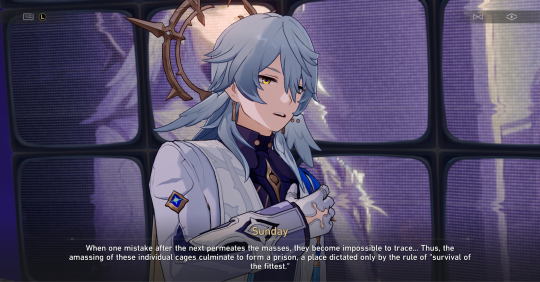
Robin: That's just sophistry. If that were true, then only the powerful would have the right to determine the future. Sunday: Unfortunately, that's exactly what happens. Another name for "the future" is "self-value." [...] Sunday: Some are born weak and vulnerable, some find themselves trapped in unfortunate circumstances, some fall victim to malice and cowardice. When it comes to survival, everyone is equal, and the weak can only watch as their value [future] gets constantly diminished by external forces. (The Only Path to Tomorrow) Firefly: So, what is your definition of living a happy life? Sunday: Good question. Human consciousness is fundamentally an illusion, a cage known as "self-worth". People lured in by this illusion, make mistakes, yet still ask that external influences bear the burden. Sunday: When one mistake after the next permeates the masses, they become impossible to trace... Thus, the amassing of these individual cages culminate to form a prison, a place dictated only by the rule of "survival of the fittest." Sunday: Nature is always accompanied by predation and sacrifice... Its antithesis is known as Order. (Beauty and Destruction)
As long as the will to life must be satisfied, “survival of the fittest” will persist; in other words, the illusion of self-value ensures the law’s survival in the future. While this tells us part of why Sunday equates self-value with the future, his statement can also be interpreted through a psychoanalytic lens, particularly as it relates to transference and the repetition compulsion. Transference is the process by which people unconsciously cast the roles of past figures onto current relationships, repeating past trauma in the present. The individuals filling the roles may change, but the roles themselves remain constant through time. Through transference, a person’s unresolved past and unconscious beliefs adopted from those experiences construct an illusion that passes for objective reality:
"What psycho-analysis reveals in the transference phenomena of neurotics can also be observed in the lives of some normal people. The impression they give is of being pursued by a malignant fate or possessed by some 'daemonic' power; but psycho- analysis has always taken the view that their fate is for the most part arranged by themselves and determined by early infantile influences" (Freud, 1920, p. 15).¹³
Transference is driven by an underlying compulsion to repeat the past known as the repetition compulsion. In Beyond the Pleasure Principle, Freud found that the repetition compulsion does not solely operate in service of the pleasure principle as it was previously understood, but also as an unconscious compulsion to repeat pain. Psychoanalyst and scholar Jonathan Lear provides an example of this in Freud (2015) when he describes the nature of unconscious mental processes:
“Suppose, to take a highly simplified case, a child has an unconscious fantasy, ‘I am the unloved one.’ Precisely because this fantasy is exempt from contradiction and is presented in a timeless mode, the person will tend to interpret life’s passing events through a frame of feeling unloved. The person will focus on real-life slights; but even kind gestures will tend to be treated with suspicion, as though there must be some underlying motive (‘He was nice to me only because he wants something from me’). The world will come to seem an unloving place, thus reinforcing the fantasy. The person can come to feel that she is somehow fated to be unloved.” (Lear, 2015, p. 6).¹⁴
To put Lear’s example in Sunday’s terms, an unconscious fantasy adopted from past experiences is the underlying material that constructs the illusory prison of self-value. The prison shapes our perception of reality, and this perception then reinforces the prison’s ‘form’ by affirming the unconscious fantasy. If one’s perception or the fantasy were to change, the dimensions of the prison would change with them, reshaping ‘reality.’
The prison of self-value therefore ensures the past’s survival in the present by facilitating its repetition; through repetition, the past becomes the prisoner’s future. In other words, by materializing the unconscious fantasy in reality through actions, the prison of self-value becomes one’s fate. We can then apply this framework to Sunday’s ideology: if fantasy and perception co-construct one another to create an individual human consciousness, it follows that Sunday’s ideology, as a reflection of his perception of the world, is rooted in an unconscious fantasy too, a belief that he has about himself.

Sunday: Well, don’t forget this…. not everyone really has a future.
So, just what is that belief? The past holds great significance to Sunday, and he vividly remembers the consequences of each decision he made. While in his inner world, he recounts three decisions that led him to lose faith in the Harmony and choose the Order for salvation. These decisions involved a Charmony Dove he and Robin found as children, a fraudulent stowaway, and Robin’s brush with death while she traveled beyond Penacony. He then asks which choice the Trailblazer would make given each scenario—the same choice as Sunday did, or some other choice? However, the choices are limited to either-or decisions between Sunday’s choice and its extreme opposite: either support Robin’s journey, or prevent her from taking it; either remain silent, or ask the Bloodhounds for mercy; either cage the Charmony Dove, or build a nest for it in a yard of predators, and no matter the choice, it always ends in tragedy.

Sunday: I know the suffering of being tormented, the turmoil of losing your way, how sorrow… and even despair, set in when matters don’t work out. All of this causes me unending pain, because this is not what “happiness” is at all.
This is because Sunday understands the world in terms of dichotomies, where things are either good or bad, righteous or sinful, strong or weak. It’s also why Sunday’s choice in each scenario is cast as the “good” choice, because it was made with kind intentions, while its opposite is the “bad” choice because it lacks compassion for the individual. The unfortunate outcome of either decision, both real and imagined, is therefore meant to persuade the player that Sunday’s perspective is ultimately correct, because “good” choices do not necessarily result in “good” outcomes in a disorderly world. Rather, choice itself is a chaotic variable that introduces uncertainty, splitting life into infinite paths and possibilities, or “untraceable mistakes.” In order to control outcomes, choice must be removed, even if such an outcome can only be achieved through fantasy.
To see the world in this way is to inhabit the monochrome world Acheron first referred to in Act I, a world where it’s all or nothing, and everything appears black or white. This manner of thinking constructs each decision as a false dilemma, which artificially limits the available options or perspectives to two extremes. For our purposes, this is among the most meaningful hints as to what Sunday’s unconscious fantasy is, because it is born out of his intense need for control, which is both a defense against the fantasy and the primary way that he repeats it.
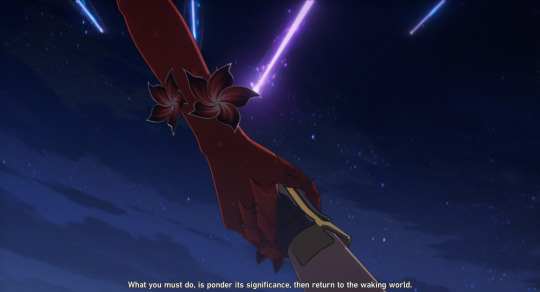
Acheron: The golden dream is getting restless. In the coming long night, I'm afraid you will face many tribulations and witness many tragedies. And finally...your sight will only see black and white. Acheron: But please believe me that in that monochrome world, there will be a glimpse of fleeting red, and when you make a choice, it will reappear before you once more… (The Knocking at Ungodly Hours)
With this in mind, we can use Sunday’s black and white thinking to our advantage. Upon closer observation, a common theme is repeating itself in each decision Sunday did make, with each individual cast in the same role at different points in time. Despite his best intentions, Sunday’s actions alone can’t protect them from tragic outcomes—indeed, he is powerless against their fate. According to his ideology, there are inherently strong individuals and inherently weak individuals, and the strong have the power to defend the weak, but often choose not to; by this same logic, if Sunday can’t defend the weak despite his intentions to do so, then he must not be strong. He must be weak.
This brings us to the Charmony Dove’s fate, which is undoubtedly the most significant to his character out of the three scenarios, and acts as a symbol of the difference between Sunday’s and Robin’s beliefs regarding humanity. The bird is an object that they project these beliefs onto, shaped by their individual “cages,” and its fate reflects those beliefs back at them, reinforcing their diverging fantasies:
Sunday: This place is too dangerous for a fledgling. Let's take it with us — we can put it on the wooden shelf in front of your window. Robin: Okay! A bird like that must have a beautiful singing voice. But where will it live? Sunday: I'll ask the family head to build a cage for it. Robin: A cage... but then it won't have the freedom to fly, right? [...] Robin: Even if it's small and not fully feathered, and can't sing... it didn't come into this world just to be locked up in a cage. Robin: Birds... belong to the sky. (The Only Path to Tomorrow)
To Robin, the Charmony Dove is full of potential, and its fate can’t be determined by a single moment of its life, but Sunday regards it with caution and uncertainty; one wrong move, and the bird will take its last breath. This difference becomes the central disagreement in their debate over the sweet dream’s value, and Sunday reveals the bird’s tragic fate to Robin in order to drive home his point:
Sunday: Shortly after you left, it crashed to its death right in front of your window. Robin: ...I had surmised as much. I knew you wouldn't have avoided mentioning the bird for no reason. Robin: Despite that unfortunate outcome, I still believe it was the right decision. Birds aren't meant to spend their lives in cages... They belong in the sky, even if they can't fly. Sunday: But here's the thing. If there are birds in this world that can never fly, can we really assert that they belong in the sky?
Sunday’s meaning is clear: flightless birds are no different from those individuals who are born weak, and their fate is to watch their future disappear under the pressure of external influences. While Robin came to embody her beliefs by leaving Penacony behind, Sunday stayed and rose through the Oak Family’s ranks, never leaving the sweet dream’s cage. He embodies his beliefs by denying himself a future, because to choose otherwise would contradict his fantasy—that he is a flightless bird too, and therefore has no “value”:

[Sunday]: The victor bears the responsibility of victory. Finish me... and fly into the sky. [Robin]: We were supposed... to fly into the sky together. [Sunday]: ... [Sunday]: If only... I could… (The Feather He Dropped)
Sunday's unconscious fantasy—that he is an inherently weak person, a bird that will never fly—is a reflection of his self-value. By unconsciously repeating the pain of his past, his fantasy becomes the illusory prison known as one’s future, a self-fulfilling fate.
But all of this is only a small piece of the puzzle. It tells us what the unconscious fantasy is and how it affects him, but it doesn’t really tell us why he has it in the first place. Just as the belief was hidden in the shadows of Sunday’s ideology, its origin is hiding behind something even more conspicuous—a grand performance on the dreamscape’s finest stage.
An Infantile Drama
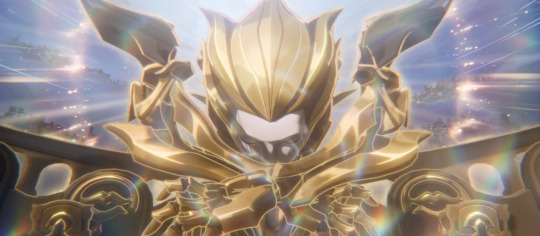
Trailblazer: Where is the Stellaron? Why am I not seeing it? Sunday: It hides behind the curtain. Or rather, it is the theater itself. (Everything that Rises Must Converge)
Naturally, this leads us to the Embryo of Philosophy.
There is so much to talk about between the three phases of this entire fight, not to mention the mountains of references it makes to other media. However, I want to train our attention on the Embryo’s tears. Why is it crying, and why at this particular moment? The religious meaning of its tears is clear, but what is their psychoanalytic significance?
First, let’s consider their context. The Embryo’s golden tears stream down its face with each turn of “Im Anfang war das Wort” (“in the beginning was the word”), stretching its arms towards the sky with palms open in worship of Order. On the 8th turn, it reaches toward the sky to ask for Ena's blessing; Ena answers its call, reaching down to grant it power, nearly touching the Embryo’s outstretched pointer finger with THEIR own. In doing so, they create a mirror image of Michelangelo's The Creation of Adam, a depiction of God giving Adam the spark of life.
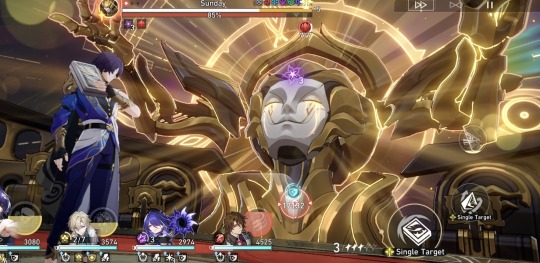

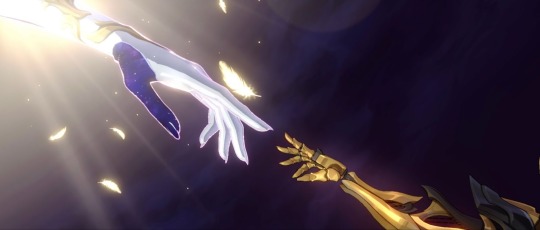
This artistic and religious reference, alongside the Embryo’s fetal imagery and tears, leaves no doubt that the third phase in the fight is Sunday’s “moment of birth” as an Aeon, and this suggests that birth must inform the answer to our original question. So then, why does the Embryo’s “birth” bring it to tears? The answer lies in the meaning of Sunday’s performance in Penacony Grand Theater, of which the Embryo is just one part, and how it relates to his unconscious fantasy.
In a final effort to dissuade the Astral Express from resisting his plan, Sunday stages a dramatic retelling of the Order’s Genesis story and Penacony’s history that chronicles its changing masters through the eras. As an immersive stage play, its completion hinges on the crew’s participation, which involves slaying the master at each act’s conclusion in order to usher in the next one. Through his play, Sunday argues that humans crave a master who can provide them with meaning in the face of chaos, and because of this inherent weakness, progress is an illusion. The past, present, and eternal show of human history is one of endless repetition and self-delusion – though the individual master may change, humans remain puppets by their own design.

The Past, Present, and Eternal Show
This fraught relationship between humanity and its masters was a foundational point of Freud’s theory of the death instincts, which he grounded in his observations of infantile play. While he was staying with his daughter’s family, Freud noticed a peculiar game his grandson played with his toys that further called the pleasure principle’s dominance into question. The game began when his grandson threw the toys out of sight to make them “disappear,” after which he would retrieve them with his mother’s help to make them “return.” Freud deduced that this game (Fort/Da) was a reenactment of his mother “disappearing” when she left him at home, and speculated that it played a crucial role in his grandson’s good behavior during her absences.¹⁵ If the game was in service of the pleasure principle, Freud expected that the entire game would be played to completion, where the pain of the toys’ disappearance is endured for the eventual pleasure of their return. Instead, his grandson often only repeated the disappearance – the “drama’s” most painful part.¹⁶
In infantile play, several instincts intersect with a child’s memory in order to process psychological stimuli.¹⁷ Repetition facilitates their sense of mastery over unfamiliar stimuli, whether pleasurable or painful,¹⁸ and play offers a safe, fictional space for children to make sense of reality, where they can leave behind their role as spectators of life’s phenomena and become actors on its stage.¹⁹ By playing an active part in a memory’s repetition through play, indeed by controlling it, children move toward an even grander wish in their hearts: “the wish to be grown-up and to be able to do what grown-up people do.”²⁰ Freud suspected this was why his grandson played the game, because it offered him a sense of agency over his mother’s absences that reality could not.
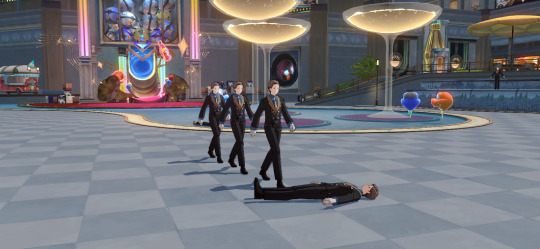
The Golden Hour base model and its uncanny inhabitants, found in Dewlight Pavillion. One of the Oak Family Head’s toys.
However, Freud’s point was not that repetition in infantile play is pathological, but rather that when trauma is repeated in adult life—a time when experiences do not feel so new, and therefore do not bring as much pleasure or sense of mastery per repetition²¹—the mind is reverting to a previous state,²² namely to the way it functioned in childhood. In other words, the repetition compulsion is related to the instinct for mastery, and trauma repetition is the mind’s attempt to master a painful experience by replaying the past in the present, as it did through infantile play. In this way, life itself becomes the game, or a “play,” and fantasy merges with reality.
Now, let’s examine the conclusion of Sunday’s stage play, as humans take fate into their own hands on the Genesis story’s seventh day:
2:1 THEY bestowed upon all beings the gift of ‘meaning.’ All had been brought into existence. And then, THEY rested from all THEIR creative work. 2:2 However, once again, all the beings beseeched Ena, praising THEM, the magnificent Aeon with divine power, but with a tone of curse. 2:3 ‘With Order, you have defined all things in the Cosmos, yet this only made us realize that we are mere puppets within your grasp.’ 2:4 Thus, on that day, all beings united and cast the Aeon into the pit of destruction. 2:5 And so it was done. That marked the seventh day. (Lost Property readable)
Like a parent guiding their child, Ena imbued the universe with meaning through Order, weaving the answer to each of humanity’s questions into THEIR grand symphony. Humanity then recognized its passive role in relation to Ena, a higher being who is able to act on the universe’s grand stage, while mortals merely watch THEM. And just as Freud’s grandson casts away his toys in the first part of the drama, humanity then casts Ena into the abyss to make THEM “disappear,” rejecting their old master in a bid for control only to seek THEM out again in the eternal show. In their effort to become masters, humans seal their fate as puppets; or by another interpretation, this is the intended outcome all along, because out of the two desires at play here—the desire to replace the master themselves and the desire to submit to another—answering to a new master is far easier than becoming one:
[Tiernan]: Sin Thirsters... the obsessions of the Pathstriders. They emerge from the depths of IX, seeing themselves as masters of their own destiny, unknowingly repeating the actions of their past lives. [Tiernan]: They emerge from the Nihility and head toward it, leading purposeless lives… (And on the Eighth Day) Butler: "Either I shall be my own master, or I shall return to my former master! I shall not submit to a new master under any circumstances!" "I wish they could regain their reason [calm down] and cast away the shackles of hypocrisy," proclaimed the new master. (Tune Butler's emotion to Calm) Butler: "Without a master, who can grant me true freedom?" (Everything that Rises Must Converge)
By returning the planet to Order, its Pathstriders hope to reinstate the earlier phase of galactic history before Ena was absorbed by Xipe the Harmony. Understood through Freud’s observations of infantile play, this can be seen as a struggle between retaining the innocence of childhood, the previous state, and the “grand wish” to become an adult with agency; desires that are at once contradictory, and yet work in tandem with one another. But is this really all that Sunday’s performance is about?
For the moment, let’s return to trauma repetition and its conflict with the pleasure principle. To Freud, trauma is like a bodily wound, where unfamiliar stimuli “breach” the mind’s protective layer and overwhelm it; the repetition compulsion is a response to this breach, replaying past trauma in the present so that the mind learns to anticipate the disturbance in the future:
“The fulfilment of wishes is [...] brought about in a hallucinatory manner by dreams, and under the dominance of the pleasure principle this has become their function. But it is not in the service of that principle that the dreams of patients suffering from traumatic neuroses lead them back [...] to the situation in which the trauma occurred. [...] These dreams are endeavouring to master the stimulus retrospectively, by developing the anxiety whose omission was the cause of the traumatic neurosis” (Freud, 1920, p. 26).²³
This brings us to the final pillar of Freud’s death drive. If the repetition compulsion is an instinct, then it must not only be common to all organic life, but also must originate from a shared disturbance in evolutionary history. But a disturbance of this scale, he realized, could only be found in what shaped life’s beginning—the physical and chemical processes that cultivated life on Earth, rousing the first unicellular organism from its slumber in the primordial soup, and animating what was once dead. The repetition compulsion, then, was born from this original trauma of organic life, unanticipated by that ancient sea. And if that is the case, then the repetition compulsion’s true purpose is clear: it aims to return the living to its slumber, to the death state, and it dutifully follows life’s “circuitous paths” to bring about that end:
“It would be in contradiction to the conservative nature of the instincts if the goal of life were a state of things which had never yet been attained. On the contrary, it must be an old state of things, an initial state from which the living entity has [...] departed and to which it is striving to return by the circuitous paths along which its development leads. If we are to take it as a truth [...] that everything living dies for internal reasons—becomes inorganic once again—then we shall be compelled to say that 'the aim of all life is death’ and, looking backwards, that 'inanimate things existed before living ones’” (Freud, 1920, p. 32).²⁴
The implications of this theory can be seen in Penacony’s oceanic imagery, which signifies both the unconscious memory of that primordial state and the salvation the sweet dream offers from reality. To enter the dream, The Reverie’s guests submerge themselves in a shallow pool and emerge on the “other side” reborn, baptized into the religion of pleasure and cleansed with the dream’s fiction. The primordial memory, then, is the lost childhood of organic life, a previous state it wants to return to — the unity before the violence of individuality.

Sunday: Some are born weak and vulnerable, some find themselves trapped in unfortunate circumstances, some fall victim to malice and cowardice. When it comes to survival, everyone is equal, and the weak can only watch as their value [future] gets constantly diminished by external forces. [emphasis added].
We also don’t need to stretch our imagination to connect all of this back to Sunday, who compares the weak to spectators of their own demise, just as Freud likens children to spectators of life’s phenomena, and perceives “external forces” as catalysts for change—for Sunday, they whittle away at one’s future, while for Freud they disturb a peaceful slumber.
How is all of this related to the Embryo’s tearful birth? The primordial soup was a cradle for organic life in its infancy, but it was also the “mother” that birthed it, and the death instincts compel life to return to its embrace. In Inhibitions, Symptoms, and Anxiety (1926), Freud identifies birth as the first “danger-situation” an individual experiences, because birth requires separation from their mother.²⁵ By coming into the world, newborns are inundated with unfamiliar stimuli, like the unexpected “breach” that characterizes trauma, and these sensations in turn produce the first instance of anxiety.²⁶ Though they can’t yet conceptualize this danger as the loss of their mother, for mental life at this stage doesn’t distinguish between the self and other objects, infants soon learn the uncertainty that accompanies danger can be relieved through their mother, who “satisfies all [their] needs without delay”; anxiety, then, is a response to situations where these needs go unsatisfied, and over which they alone have no control.²⁷
But birth is only the first separation between mother and child; the final separation, of course, is death. If the former’s danger is characterized by the mother’s absence (“object-loss”), then in death this danger becomes permanent. In Mourning and Melancholia (1917), Freud writes that mourning is a process of “[accepting that] the loved object no longer exists” and of withdrawing one’s interest (“libido”) from them.²⁸ Melancholia, its fraternal twin, shares several affective traits with this process, namely “a turning away from reality […] and a clinging to the object through the medium of a hallucinatory wishful psychosis”—that is, by living through fantasy.²⁹ Where melancholia distinguishes itself from mourning, however, is in one’s sense of responsibility for the object’s loss. In other words, the melancholic is tormented by a pervasive sense of guilt:
“In mourning it is the world which has become poor and empty; in melancholia it is the ego itself. The patient represents his ego to us as worthless, incapable of any achievement and morally despicable; he reproaches himself, vilifies himself and expects to be cast out and punished […] He is not of the opinion that a change has taken place in him, but extends his self-criticism back over the past; he declares that he was never any better” (Freud, 1917, p. 246).³⁰
Sounds a little familiar, doesn’t it? Transference is another way of living life through fantasy, where each new actor plays the same role in its infinite drama, in this case the “lost object.” The Charmony Dove, the fraudulent stowaway, and Robin all unknowingly take on this role in Sunday’s unconscious, as objects he is trying to protect. However, this performance is always fated to end the same way: his actions fail to save them, and he blames himself and his weakness for their loss.

If performance is the throughline between reality and fiction, then Sunday’s “play” in Penacony Grand Theater—the birth of his paradise and near-ascension as an Aeon—is yet another continuation of this eternal show. Sunday’s greatest wish, his infantile wish, is to protect everyone, and Ena’s dream facilitates its fulfillment through fantasy. To realize the dream, Sunday must usurp the power of a master (an Aeon) for himself, and he does so by fusing the Harmony and Order together to create the Embryo of Philosophy, making Xipe and Ena its 'mothers.' But the Embryo’s birth also requires the “death” of its creators, precisely because their power had to be stolen to create the eternal dream’s foundation. In other words, the Embryo must replace its parents so that it may truly become a master like them. Sunday's full performance encompasses both separations between “mother” and child at once: the separation through birth, and the separation through death.
In their Christian interpretation, the Embryo’s tears signify Christ’s empathy for human suffering, but in the psychoanalytic interpretation they suggest the Embryo’s anxiety about its performance. And this anxiety is well-founded, for all of the reasons we’ve discussed: the primordial danger of being born into the world, of emerging from “death” and becoming separate from it, and the threat of permanent object-loss if the Embryo completes the performance as planned. But we should also remember that this anxiety is in reality nothing new for Sunday, because he has already experienced all of these losses first-hand in the past. In other words, the Embryo cries because its performance reminds Sunday of something he’s experienced before, the very memory that he is trying to control—indeed master—through repetition. This memory, and the anxiety, concerns his wish’s original failure to materialize, the trauma of which laid the foundation for each subsequent “performance.” Plainly, it’s about the death of his mother, and his failure to protect her from the Stellaron disaster.
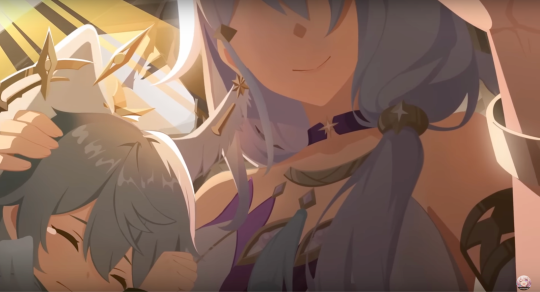
Given how he belabored the importance of his three decisions in his inner world, this may seem like a bit of a stretch. In fact, he doesn’t directly say a word about his mother at all — but that is exactly why I am so suspicious. Instead of acknowledging her with words, her death lingers in his desperate need to control outcomes, his preoccupation with weakness, and his yearning for guidance from a master, something he lost as a child when he needed it most. Perhaps this is part of what motivates him to become that master for everyone else, to replace the parent he lost by “becoming” them.
It’s also not lost on me that Sunday cries during the Stellaron disaster, further suggesting a narrative parallel between the Embryo crying and his past. In that moment, his tears highlight the incongruence between the image Sunday puts forth of himself as Robin’s protector, and the reality that he alone was never able to protect anyone. His mother died, Robin got shot, and suffering followed his decisions despite his kind intentions. From an early age, he had already given up on the possibility of sharing a stage with his sister, and eventually resigned himself to a grim fate as the universe’s lone star. While Gopher Wood’s role in reinforcing his unconscious belief should not be understated, I hesitate to say his poison is truly the belief’s origin.

“The echoes of the memories someone once held of their beloved family. Across the long night, they will accompany him in the past, present, and future.” (Echoes of Faded Dreams story)
What’s more, Sunday tells us that his end goal is not to resurrect Ena, but rather to construct his paradise on Ena’s remains, creating a world without Aeons at all. This infantile fantasy, a world without the “adult” influence of these higher beings, is a metaphor for his search for happiness after the meaningless Stellaron disaster that took his mother away from him, and to recover the innocence he lost with her passing. He seeks to create paradise from destruction, to build a new world on her remains, and become a master of it himself. Both his stage play and his role as the conductor of the paradise’s symphony only further cement this: through his performance, he asserts that he is no longer a passive observer of the disaster, no longer a spectator of his own demise or merely Gopher Wood’s puppet, but an actor and an artist in his own right. By utilizing the Stellaron to create paradise, he hopes to master his weakness.
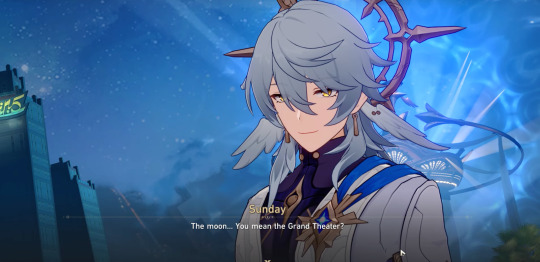
This symbolism goes crazy. What do you mean the Stellaron is a theater, it shines like the moon, it’s the reason Sunday’s mother died*, and it’s the site where he initiates Third Impact?
And I know, I know all of the Evangelion fans are saying “we fucking knew this already,” and you’re right! Hideaki Anno was also inspired by Freud, among many other psychoanalysts and philosophy giants, and Hoyoverse has never been shy about how much Anno’s work influences their own. It is undeniable that Shinji and Sunday share a character arc as it relates to the loss of their mother, and Sunday is far from the first and certainly not the last Hoyoverse character who will either, but where they differ is in the details of their death wish. In The End of Evangelion (1997), Shinji wishes for a world where he can’t be rejected by others, because there would be no meaningful difference between him and another person if they’re all just LCL soup, while Sunday wishes for a world where the weak never have to face their weakness, and weakness is no longer a “sin”; the outcome of both of these wishes, then, is a world where sin can never be repeated. But this tragedy’s ending was told from the beginning — trying to sever the cycle is the same as repeating it, and shedding one master means gaining another. Rather than preserving life and protecting it from pain and disappointment as he intended, Sunday’s dream world only guarantees its own end.
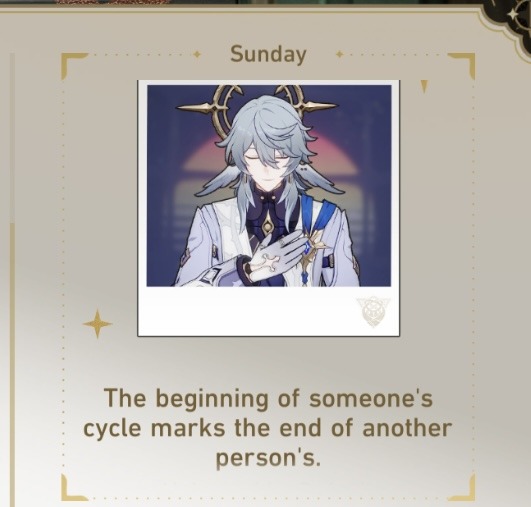
This is why the Embryo cries. Sunday’s performance is a reenactment of both the first and last severance between his mother and himself—his birth and her death—and the origin of the pain that would eventually justify the eternal dream’s creation.
*I say this with the huge caveat that Penacony lore, Halovian lore, and Sunday + Robin lore, are a bit (okay, very) confusing. It is possible their homeland was destroyed by a different Stellaron. Also, who am I to assume Halovian birth even remotely resembles human birth? I don’t know. Talk about how vague Halovian lore is right now in the version satisfaction survey and maybe we’ll get real answers.
Infinite Sin and the Will to Punishment
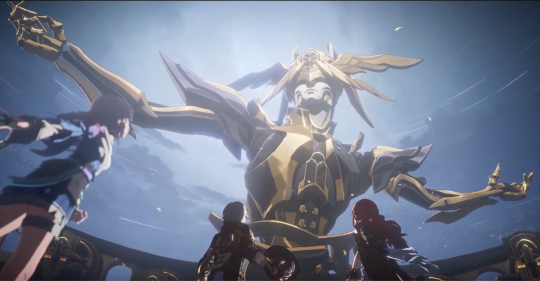
Unfortunately, it isn’t quite that simple. Freud did not believe that this pessimistic interpretation of the death instincts was the full story of the death drive, and this analysis, though fruitful, is full of apparent contradictions as a result of treating it that way. Though it’s not incorrect to assess Sunday’s actions from a self-destructive angle, this alone is an inadequate framework for illuminating the full extent of his hypocrisy. We see glimmers of it in Sunday’s inner world, when he admits the price of attaining his dream—“merely a personal and eternal sacrifice”—and in Penacony Grand Theater, when Himeko points out the fallacy that this could ever truly be a dignified existence for the many living under Sunday’s will. The tension between his willingness for self-sacrifice and desire for total domination is a core conflict of Sunday’s character arc in Penacony. These two aims constantly struggle to overcome one another, and within that struggle lies a truth about the nature of life and the meaning of Penacony’s story.
The seductive promise of Sunday’s paradise belies its reality, which requires the paradise’s conductor to remain awake until the end of time. Sunday minimizes the personal cost of Ena’s dream by portraying himself as a martyr for a noble cause, because to him this solitude truly is a meager price to pay for everyone’s eternal “happiness.” However, Robin is the first to point out that his role in sustaining the dream looks less like a heroic sacrifice than it does eternal punishment:
Robin: It's true that some people are born strong, and others are born weak. If the Trailblaze is the target of heroes, then the Harmony will guarantee that the strong help the weak. Only the people of Penacony themselves can be the saviors of their homeland. Robin: Their path of happiness should be forged by themselves. While I may not be a Nameless, I'm willing to instill courage in all those who need it. Robin: This includes my brother as well. Ena's Dream... is too cruel for him, and everyone else. […] Robin: Brother, you have heard their cries... This is not the paradise they hoped for. "Harmonious Choir" The Great Septimus: Even so, they don't know where they should be heading. That's why... I had to become the lone star in the sky to guide them. Robin: Even if that star... must hang in a perpetual night of solitude? (And On the Eighth Day)
And one does have to wonder: why would Sunday, who has clearly demonstrated his own desire to turn away from the pain of reality, deliver a fantasy world that promises just that to everyone but himself? To begin to unpack this, let’s return to the idea of guilt, which we briefly touched on in the discussion of melancholia.
Before developing his death drive theory, Freud attributed a wish for punishment to dreams and behaviors which, on their surface, contradicted the pleasure principle’s tendency to avoid pain.³¹ These dreams, he argued, represented a masochistic tendency in human nature, where “[pain] for one system [is pleasure] for the other.”³² But Freud’s understanding of masochism changed with Beyond the Pleasure Principle, which raised the possibility that masochism was originally a death instinct that was altered by the life instincts to serve the pleasure principle.³³ He was then able to take up masochism with a newly instructive angle in The Ego and the Id (1923), where he formally introduced not only the term “id” for the realm of the instincts, but also the “super-ego,” an omnipresent and judgmental conscience that defines the ego ideal.³⁴
The super-ego is a representation of the ego’s parents and their teachings, reborn from the ruins of the Oedipus complex and its unfulfilled wishes. The Oedipus complex is named for the ill-fated protagonist of Sophocles’ Oedipus Rex, who unknowingly murders his father and marries his mother, thereby fulfilling a prophecy he sought to avoid. After he is made aware of his moral failings, he blinds himself in shame and goes into exile from his former kingdom. In The Interpretation of Dreams (1899), Freud describes the Oedipus complex as an early stage of child psychosexual development where the child’s parent of the opposite sex is cast as their first sexual object.³⁵ But this nascent sexual attachment creates a dilemma for the child, because in order to fulfill the Oedipal wish (attaining a “union” with the loved-object), they have to triumph over their rival, the parent of the same-sex. The child then develops an “ambivalent” attachment to their same-sex parent, where the familial love they have for them is complicated by their desire for the other parent.³⁶ However, the child soon realizes that its options to fulfill the Oedipal wish are untenable with reality, and the price of achieving it is severe punishment at the "rival's" hands.³⁷ It then abandons the Oedipal wish by repressing it, instead developing a strong “identification” with the same-sex parent—that is, instead of trying to kill the father to be with the mother, it tries to become like him.³⁸ This identification establishes the ego’s moral framework.

On the left, Sunday crying in his ultimate animation. On the right, a photograph by Albert Greiner of actor Louis Bouwmeester as Oedipus after blinding himself in Oedipus Rex. This shit, as they say, writes itself.
Penacony’s environmental design references the super-ego through its persistent eye motif, which represents surveillance in the sweet dream and introspection in the primal dreamscape. In addition to its psychoanalytic roots, the eye motif in Sunday’s character design both furthers his angelic iconography and visually connects him to Ena, whose eye represents THEIR sovereignty over mortals through the law.
Surveillance is central to any system of government that prioritizes control like the Order does, and the resulting paranoia of such a system encourages rigid adherence to its rules. Likewise, the super-ego watches the ego’s thoughts and actions for signs of transgression and punishes it for every immoral impulse, whether acted on or merely imagined. The threat of punishment is what motivates the ego to enforce the super-ego’s imperatives, repressing impulses that fall outside the sphere of moral acceptability and casting all that is not orderly outside of what comprises it. In Penacony, the analog for the super-ego is most closely found in Gopher Wood, the Dreammaster, who oversaw the sweet dream’s descent into hedonism in order to strengthen his influence and nurture the Stellaron. This is also why he is often embodied as a raven who spies on Penacony’s scenes, acting as Sunday’s “eyes” to maintain control of all the actors.

“Something Unto Death”
It should come as no surprise, then, that the super-ego also plays a crucial role in the eternal show. The super-ego is built on the teachings and morals of the past as embodied by the individual’s parents, and these values guide the ego in the present so that the ideal may be attained in the future; in other words, the super-ego ensures the past’s survival through its repetition in the present so that it becomes one’s future.³⁹ Of course, the super-ego is not literally the ego’s father, but rather a representation of him recreated within the mind.⁴⁰ Perhaps this is why Gopher Wood is able to “speak” through each Oak Family member in the present, despite his body’s immolation in the past — his rules survive in their minds as the supreme source of moral guidance. That, and dream logic.
As both a political and religious fundamentalist leader in the dreamscape, Gopher Wood radiates the “Father” archetype, marking him as an authority not only of Penacony’s civic prosperity, but of righteousness itself. Because of this, he is a surrogate for divinity—for Xipe the Harmony in public, and for Ena the Order in private—capable of judging the ego in "God’s" place. While this relationship to some extent applies to all Oak Family members, it is especially true for Sunday and Robin, for whom Gopher Wood literally plays the role of their adoptive father. For Sunday, as Gopher Wood’s successor in the Oak Family and tool of the Order, this takes on an even greater significance. Their relationship constitutes a faithful representation of the ego and the super-ego, where Sunday is taught by Gopher Wood to uphold the Order’s ideals to be a morally righteous person, and to repress all of his ‘imperfection’:
“As a substitute for a longing for the father, [the super-ego] contains the germ from which all religions have evolved. The self-judgment which declares that the ego falls short of its ideal produces the religious sense of humility to which the believer appeals in his longing” (Freud, 1923, p. 33).⁴¹ “It's said that the master of this pavilion suffers from severe compulsions, but this table clearly shows that he has been cured.” “Unlike a long table, round tables have no sense of priority or opposition, it is very likely that they are an Aeonic candidate for the Path of Harmony” (Conference Round Table investigations in Dewlight Pavillion) [emphasis added].

Killing the “Father”....to be with the ���Mother”?
But the super-ego’s standards aren’t truly meant to be achievable for the ego, because the ego’s identification with the parents is defined by its difference from them; to disrupt that identification would be to confuse the ego’s sense of self.⁴² This is yet another manifestation of the ego’s conflict between remaining subservient to its “master,” the super-ego, or overthrowing it to become the new master:
“[The super-ego’s] relation to the ego is not exhausted by the precept: ‘You ought to be like this (like your father).’ It also comprises the prohibition: ‘You may not be like this (like your father)–that is, you may not do all that he does; some things are his prerogative’” (Freud, 1923, p. 30).⁴³
Thus, the ego creates an impossible task for itself. It wants to be seen as a morally righteous subject, and it tries to achieve this by modeling its every thought and action after the “Father.” However, the ego can never truly censor all 'impure' impulses, and for this reason it will always be deserving of punishment; this is the source of the ego’s persistent sense of guilt.⁴⁴ The tension between the super-ego and the ego is what Freud referred to as “moral masochism,”⁴⁵ wherein the ego not only fears the super-ego’s punishment, but also unconsciously desires it. Moral masochists do not care who punishes them and do not limit their suffering to sexual fantasies—instead, “the suffering itself is what matters.”⁴⁶
This desire is the result of several transformations that occur in the death instincts. Earlier, I mentioned that we were working with an incomplete understanding of the death drive—that the purpose of life is to return to death. But life is almost never this frictionless, and neither is instinctual life. In reality, the death instincts all trend toward self-annihilation and restoring the state before life, but the life instincts persist alongside them to preserve life. Taken alone, they are only capable of stagnation; together, as each struggles against the aims of the other, life can evolve and progress into new territory, ‘blazing a trail’ towards new beginnings — “life itself [is] a conflict and compromise between these two trends.”⁴⁷ To make "life" possible, the death instincts are fused with the life instincts, making it difficult if not impossible to observe any one behavior that purely exhibits the death instincts.⁴⁸
One product of these fusions is the sadistic instinct. In The Economic Problem of Masochism (1924), Freud affirms what he had only surmised in Beyond the Pleasure Principle—that sadism is an inversion of a primary masochism, where what was once a death instinct bent on self-annihilation is now a “destructive instinct” fused with Eros that seeks to 'master' others:
“The libido has the task of making the destroying instinct innocuous, and it fulfills the task by diverting that instinct to a great extent outwards [...] towards other objects in the external world. The instinct is then called the destructive instinct, the instinct for mastery, or the will to power” (Freud, 1924a, p. 163).⁴⁹
But a portion of that aggression is retained in the ego, attached to the super-ego (the 'master'), and redirected towards the ego; hence, moral masochism.⁵⁰ In other words, the desire to punish others is reconfigured through the super-ego as a desire to punish oneself.
So what does “punishment” mean here? Freud concludes The Ego and the Id by arguing the fear of punishment is really a fear of losing love and protection from the parents, “Destiny,” or the super-ego. If their love is only garnered through moral behavior, then immorality risks its withdrawal. Without love, the ego is vulnerable to the world and its dangers, and to the possibility of its death—thus, the fear of punishment is really the ego’s fear of death, and consequently, its desire for death:
“The fear of death in melancholia only admits of one explanation: that the ego gives itself up because it feels itself hated and persecuted by the super-ego, instead of loved. To the ego, therefore, living means the same as being loved [...] But when the ego finds itself in an excessive real danger which it believes itself unable to overcome by its own strength [...] it sees itself deserted by all protecting forces and lets itself die” (Freud, 1923, p. 61).⁵¹
Now, let’s consider the origin of Sunday’s melancholy, his failure to protect his mother. This ‘sin’ is at the center of his performance, and it is the pain he keeps repeating over and over again. He repeats this pain because he feels guilty for being too weak to protect his loved ones, and that guilt finds its source in his severe and unforgiving super-ego. Sunday suffers immensely from the responsibility he feels for everyone’s happiness, let alone his loved ones’ safety; it is strongly implied that he has obsessive-compulsive disorder, a condition that likely wasn’t helped by the Order’s strict rules. But Sunday fundamentally suffers for the same reason that everyone else suffers — because ‘sin’ is infinite for imperfect beings, and no amount of repression can change that. The guilt he feels for this is also infinite. One of the reasons that Sunday volunteers himself as the Order’s sacrificial lamb is because he believes the suffering of others to be of higher importance than his own, certainly, but it is also because of the self-punishment he is promised through the plan’s outcome. In other words, his infinite solitude is a form of justice for his original sin and is, by design, a death sentence.
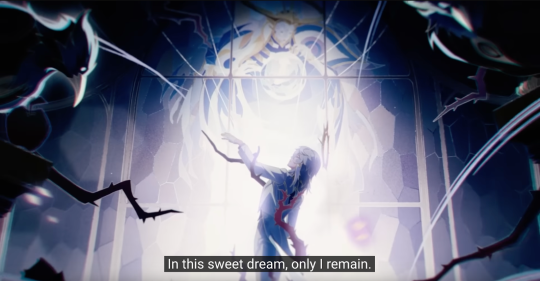
This leaves us with our final contradiction to untangle. The deceit of Sunday’s dream world is its benevolent veneer, which obscures the violence of its compulsive unity at the expense of individuality. Before his performance in Penacony Grand Theater, Himeko acknowledges Sunday has “a strong conviction and a desire for dominance” that cannot be satisfied through debate alone; he derives far more pleasure from demonstrating his superiority through example. We witnessed that aspect of his personality firsthand when Sunday subjected Aventurine to a trial from the Harmony and branded him with its death sentence, an outcome he took utmost care beforehand to ensure was predetermined. However, when Himeko calls Sunday on the hypocrisy of his martyrdom, he dismisses it and shuts down any further debate:
Sunday: True goodness can only be achieved through faith. Himeko: Allow me to point out that falling into a permanent slumber is not happiness, especially when those people are driven by someone else's will in their sleep. […] Sunday: My sole objective is to create a paradise free from Aeons, where the Order ensures the dignity and happiness of all humanity. A paradise exclusive to us human beings. Himeko: That's not the case. If people are to live with dignity, there must be nothing and no one above them. Himeko: In your so-called paradise, you would be the one reigning supreme. Sunday: Looks like we won't be able to convince each other. Now that our conflict has been destined, let's unveil our Paths and reveal to the universe the true path. (Everything that Rises Must Converge)
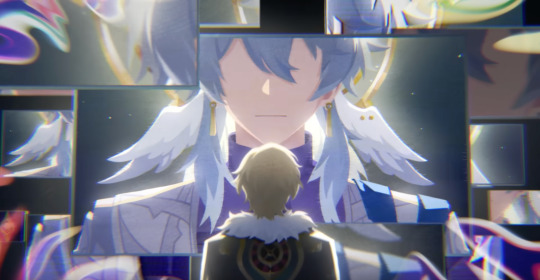
You know he enjoyed every second of this. (From Aventurine’s “A Moment Among the Stars - Inherently Unjust Destiny” trailer).
Circumstances aside, good intentions or not, Sunday is not without his own stubborn will that he imposes on others. Acknowledging this neither throws everything we’ve discussed beforehand out the window, nor does it suggest that Sunday’s martyrdom isn’t genuine. It does ask whether emphasizing Sunday’s martyrdom at the expense of his capacity for sadism is possible without disregarding his agency. In other words, Sunday did not create a dream world that excludes himself by design solely to punish himself and move closer to death; the control it offers him over others, though illusory, is just as appealing. Playing “God” in this way is an extreme and, in a sense, ‘aggressive’ expression of his own will to life, an equally fervent wish to surpass his “master,” protect the weak, and forge a new beginning.
In Sunday’s manifestation of Dominicus, we see both the sadistic instinct and the masochistic instinct represented as two sides of the same being. On one side is the confident and domineering Septimus, who, as the maestro of the eternal dream, embodies the sadistic instinct for mastery over others; on the other side is the Embryo of Philosophy, representing the masochistic instinct to return to the mother.
We’ve already discussed the Embryo of Philosophy at length, but Septimus also merits closer attention. In contrast to the Embryo’s fragile, withdrawn posture and emotional vulnerability, Septimus is towering, ostentatious, and grandiose; it makes wide, sweeping gestures that cover the entire stage, carrying itself with an authority that commands the audience’s attention. Indeed, Sunday puts on a voice as Septimus**, lowering his pitch and raising its volume so that it booms with the power he so desperately craves. Even its title, “The Great Septimus,” reads more like a character in a child’s fantasy than a threatening embodiment of Order with the means to suppress autonomy. In other words, Sunday treats Septimus as a persona, an image he wants to project into the world, or a “fictional” version of himself; plainly, it is a manifestation of his ego ideal.

The destruction of this nascent Aeon’s body therefore holds great significance as we move into the conclusion of Sunday’s character arc, at least for his role in Penacony. Dreams exist in the liminal space between reality and imagination, much like the “self” straddles the ideal and the real. Destruction and creation are rules of the universe that can’t be transcended, and the “self” is always in flux; but because of this chaos, there is always a chance to change one’s fate. Septimus represented Sunday’s infantile wish to protect everyone, no matter the cost, and the Embryo of Philosophy signified his desire to remain the same forever, as he was in childhood. Without their armor to protect him from reality, he once again faces the primal fear of life and the inevitability of one’s death. But rather than letting himself die in an ocean of guilt, there’s a chance to write a new ending to his ill-fated play.
**It’s apparent that the boss’s voice has certain effects on it that contribute to this, but I noticed something a little more than that while listening back to some cutscenes that I believe were acting choices on the VA’s part. Also, this judgment is based on the English dub.
TL;DR: someone get this man some serotonin immediately.
That’s it! I really wanted to include an analysis of Sunday’s new outfit here that ties it to Nietzsche’s The Birth of Tragedy and back to The World as Will and Idea, but I ran out of time. :( It will have to wait for another post. Thank you so much for reading <3
References:
Numbered external citations with page numbers can be found here:
https://pastebin.com/2jXQGTHk
List of Freudian Texts Referenced:
Mourning and Melancholia (1917) Beyond the Pleasure Principle (1920) The Ego and the Id (1923). Page numbers are given from my hard copy. The Economic Problem of Masochism (1924) The Dissolution of the Oedipus Complex (1924) Civilization and Its Discontents (1930). Page numbers are given from my hard copy. Inhibitions, Symptoms. Anxiety (1926)
Other Texts Referenced:
The World as Will and Idea by Arthur Schopenhauer. Page numbers are given from my hard copy. Freud (2015) by Jonathan Lear, 2nd edition. Page numbers are given from my hard copy.
Further Reading/Watching:
I highly recommend this article series by solenestuaries of Hyperion Team 3rd on substack. The first is Honkai Impact 3rd focused, the second is a mix of Honkai 3rd Part 2 and Honkai: Star Rail 2.0 focused:
Part 1: What do we talk about when we talk about dreams?
Part 2: “Why does life slumber?”: Dreams, Entropy, and the Many-Worlds of Quantum Mechanics
I am greatly indebted to her analysis for convincing me to go beyond Freud’s A General Introduction to Psychoanalysis. Her grasp of psychoanalysis and schizoanalysis is staggering and thought-provoking. Do yourself a favor and read all of her articles!
Destruction as a Cause for Coming Into Being by Sabina Spielrien. The inspiration for Beyond the Pleasure Principle.
Origins and Mysticism of the Death Drive in Psychoanalysis & the Philosophy of Transgression by ESTOERICA. I was wayyy too deep into writing this post by the time I discovered this video, but please for the love of god just watch it and prepare to have your mind blown.
#honkai star rail#hsr#sunday hsr#hsr meta#hsr sunday#penacony#me before 2.2: yeah sunday is cool i guess vs. me now:#this essay is longer than my graduate thesis#long post#character analysis
66 notes
·
View notes
Text
“Citizens,” said Enjolras, “what that man did is frightful, what I have done is horrible. He killed, therefore I killed him. I had to do it, because insurrection must have its discipline. Assassination is even more of a crime here than elsewhere; we are under the eyes of the Revolution, we are the priests of the Republic, we are the victims of duty, and must not be possible to slander our combat. I have, therefore, tried that man, and condemned him to death. As for myself, constrained as I am to do what I have done, and yet abhorring it, I have judged myself also, and you shall soon see to what I have condemned myself.” Those who listened to him shuddered.
“We will share thy fate,” cried Combeferre.
“So be it,” replied Enjolras. “One word more. In executing this man, I have obeyed necessity; but necessity is a monster of the old world, necessity’s name is Fatality. Now, the law of progress is, that monsters shall disappear before the angels, and that Fatality shall vanish before Fraternity. It is a bad moment to pronounce the word love. No matter, I do pronounce it. And I glorify it. Love, the future is thine. Death, I make use of thee, but I hate thee. Citizens, in the future there will be neither darkness nor thunderbolts; neither ferocious ignorance, nor bloody retaliation. As there will be no more Satan, there will be no more Michael. In the future no one will kill any one else, the earth will beam with radiance, the human race will love. The day will come, citizens, when all will be concord, harmony, light, joy and life; it will come, and it is in order that it may come that we are about to die.”
Enjolras ceased. His virgin lips closed; and he remained for some time standing on the spot where he had shed blood, in marble immobility. His staring eye caused those about him to speak in low tones.
Jean Prouvaire and Combeferre pressed each other’s hands silently, and, leaning against each other in an angle of the barricade, they watched with an admiration in which there was some compassion, that grave young man, executioner and priest, composed of light, like crystal, and also of rock.
#this is my favorite chapter in the whole brick#enjolras as executioner and priest of the republic you mean so much to me#we will share thy fate makes me want to cry every time#the love the future is thine paragraph is perhaps one of my favorite passages of literature ever#i think you can boil down so much of les mis to this passage#i want it tattooed on me so it can be with me forever!#les miserables#les mis letters#lm 4.12.8
60 notes
·
View notes
Text
Now that the bloofer lady is awake, and on the hunt already despite being a few days old, it's time to not only talk about what thy vampire represents, but also what do the victim of the vampire mean in the narrative.
So, the question is, why does Lucy as the bloofer lady drinks from children specifically? We have seen vampires prefer human adults to feed on, and with the case of Dracula and the Weird Sisters the use of babies seem to be their last resource in a heavily guarded country side. For this there are two explanations in the narrative, one watsonian held by Lucy's characterization and her themes as a being trapped inbetween youth and adulthood, and one doylist based on Bram Stoker's prejudice plus victorian england prejudice against certain groups of people that were seen as undesirables by large society.
In the doylist manner we need to see how the Count, the Weird Sisters, and now the Bloofer lady are portrayed through the british narrative (despite Bram Stoker being irish). They are described as "dangerous" and "sensual" with hard descriptions on their faces, and with quite the emphasis on the horrors they commit against children in particular. This is not to say that their actions are horrifying because they are, but seeing that the more emphasised target is kids, one has to look beyond what is in the text to see the underlined intentions with it.
And blood libel is the answer from common folklore, and the aceptable target to refer to. The vampire represents the Other, the evil yet exotic east, and the anxiety around the antisemitic caricature of the anti christian jewish person coming to polute england and use white christian children' blood in their evil unknown jewish rituals. Which is why Lucy, now as the bloofer lady, starts attacking the children first, as a symbol to declare her as a new "beast of the night", and to underline how now she is away from god's light just like victorians thought their jewish communities were. Acceptable targets turned into the Other representing the monster that affirmed the already held bigotry of the victorians.
In the watsonian manner, Lucy died neither as a child nor a proper adult. Never entering adult society as she was infantilized by everyone around until her death, yet wanting to shed the remains of child like innocence from her life. This limbo that makes Lucy's existance as a vampire into an uncanny presence of the night which gives us why she hasn't attacked any adults. It's not that Lucy can't attack adults, is that for her is far easier to lure children since she is the poster image of the kind of the "not adult" girl that children may be curious about, and easier to trust.
Lucy is described as a the perfect victorian girl (not counting her inner turmoil around her whole life), so she probably already knows how to entertain children since the expectation of motherhood was already upon her. The bloofer may not remember who she was before being, but the manners taught to her may still be floating inside her head, instructing her what to do after being seen by a child. Act like a sisterly figure, play with them, ask them to follow you (after all children have to obey) on a walk, be pleasant but not condescending, then bite and feed.
With the one thing in the narrative that indicates that Bloofer Lucy still deserves salvation is the fact that she leaves the children alive, and relatively unharmed save the bite wounds on their necks.
#Lucy's transformation is akin to lost innocence#And she has only spent a single day dead yet its already feeding#dracula daily#dracula#lucy westenra#antisemitism
65 notes
·
View notes
Text
*runs in *
UPDATE ON THE MONSTER FIC AND HOW MONSTERS EXIST IN THE FIRST PLACE:
✨LOBSTERS ✨
GOODBYE
#We Thy Monsters#original work#original world#original fiction#monster story#monsters#sci fi#i am losing my mind#and i love it#I revel in this chaos
0 notes
Note
dave. we really heckin care about you. sending a weighted blanket and some snacks of thy choice.


> Huh? Wuh? Askers, I’m fine, I assure ya!
> Sure I might’ve met god while trippin’ balls in that alleyway and sure I mighta puked put whatever remaining guts I had, but I’m all good now, I promise!
> Besides, I got ole Clementine here keepin’ me company… what better remedy than one good look at those enchantin’ blue eyes…? Gah! He’s makin’ me all giddy and shit!
> Yeah, y’all don’t gotta worry about me.
> … Although I wouldn’t deny a kebab, I’m no monster.
89 notes
·
View notes
Text
Thinking about the similarities between...
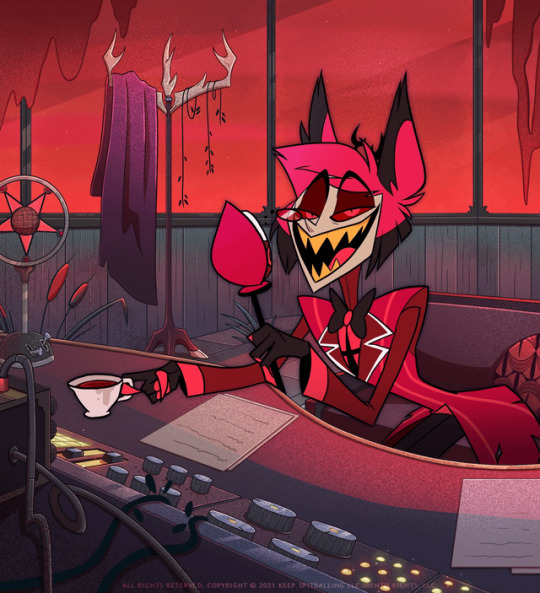
And
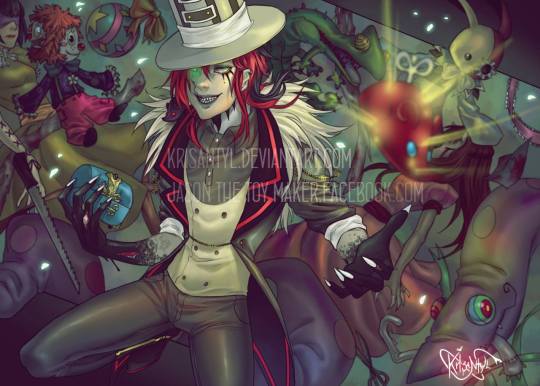
(This is the second post about him I've made in a week's span and I'm a bit concerned-)
But let's explain.
- Demon/Ghost Type
- Acts contrary to true motives (is in reality more selfish and vain than on the surface)
- Will kill most beings standing in the way of their goals.
- Loves being the center of attention.
- Alastor is absolutely a good voice claim for thy Toymaker.
- Both were once human.
- Red/Burgundy Hair.
- Views others as playthings.
- Enjoy controlling those around them. (Alastor and his souls, Jason and his chosen ones or toys.)
- Like childish interests like games or toys. (With VERY high stakes.)
- Multiple physical forms.
- Sharp nails.
- Hide in Shadows.
- Can summon minions of a sort. (Alastor = Summon Demons, Jason = Summon Toys)
- An object of physical weakness. (Alastor's Radio Cane/?, Jason's Music Box)
- Old time-y designs, inferring to dying in previous eras from present tense.
- Asexual/Aromatic.
- Green glowing when angered (Jason's eyes, Alastor's stitched smile)
- Have known rivals that counter in blue (Candy Pop, Vox)
- Dominant personalities, prefer to be in control of any social situations.
- Obvious traits of cruelty, sadism, murder, tampering, etc.
- Charismatic in nature.
- Seen as Monsters. (Accurate.)
____________________________________
Anyway, I just thought that was interesting. The thought came from me imagining Jason singing Alastor's parts in this. (Along with other pastas, like Candy Pop, Nathan The Nobody, Puppeteer, Sally, LJ, etc.):
https://youtube.com/watch?v=_lBnG5CLOmk&si=tZWcM6vILJw1i3Ex
I could definitely see Jason flattering people like this when it thrills him.
Oh, and this one! I think of it as an amber eyed Jason, and then the rough voice is his green eyed white hair form.
https://youtube.com/watch?v=wKfOA9sgfO8&si=I1nh1Ic8LAHqEcJz
- "I've got a game I wanna show you,
If I tell you my name, you'll have to play too.
I've been here for years, biding my time,
Waiting and primed until I could find you.
Just sign on the line and we can be friends,
I'll be here for you until your world ends.
Enjoy all your toys, I will supply-"
- "Come into my world, take a look at me.
I am the nightmare on the dark side of the moon.
I'm your first last resort so call me,
When you need a helping hand.
Play your cards wrong and I'll see you soon."
"And once your hunger has abated,
Don't forget your friend who waited."
============================
Anywho.
That's all.
#jason meyers#jason the toymaker#jason the toymaker hc#jason the toymaker creepypasta#creepypasta#creepy pasta#creepypasta headcanon#creepypasta headcanons#creepypasta shitpost#creepypastas#alastor hazbin#alastor#radio demon#alastor the radio demon#hazbin hotel#hazbin alastor#alastors game#alastor headcanons#alastor hazbin hotel#thank you and goodnight#character comparison
99 notes
·
View notes
Text
Dabi as Frankenstein quotes
Beware; for I am fearless, and therefore powerful


If I cannot inspire love, I will cause fear!


I ought to be thy Adam, but I am rather the fallen angel…


It is true, we shall be monsters, cut off from all the world; but on that account we shall be more attached to one another.

The fallen angle becomes a malignant devil.


#recently read this book and im obsessed#its so good#i cant stop thinking about it#mha#bnha#boku no hero academia#my hero academia#touya todoroki#todoroki touya#dabi#fuck endeavor
68 notes
·
View notes
Text
Silent Salt is the Founder of the St. Pastry Order Conspiracy
Solidarity- unity of feeling or action, especially among individuals with a common goal, interest, or BELIEF.
Freedom- The power of choice in actions, thoughts, words without hinderance. - Alternatively, the option to choose the greater good for one's self, and/or for another's sake.
vs
Silence- The restriction of actions and words, and the total control of thoughts. Complete obedience even if the actions are wrong. Tyranny.
Three Updates foreshadow the connection:
1 - The First Tower of Sweet Chaos Update
A- Aesthetics:
- The Backdrop Color scheme for the church Matches Silent Salt's color pallet
- The Shadow sister's order is the closest we get to matching outfits
- Silent's current clothes look torn, but their former attire appears to contain a lace-like fabric (Similar to the pastry order's robes) * There appears to be no imagry of Silent anywhere in to order's church. There are three potential reasons for this:
1- Silent DOES appear, but their helmet is removed (They are the praying cookies at the edges)
2- Silent HAD imagery that was removed after their imprisonment. (Reputation is important for religious groups or cults. Heretic imagery is heavily condemned.)
3- Silent REQUESTED no imagery of them to be made and they operated in the shadows of the order. (Most likely)
B- Beliefs:
* The order worships the witches, And Silent was personally baked by them, so... This could be a case of abusing a belief for the sake of control. We have absolutely no idea what the witches would have wanted, but the order's actions actually don't align with the witches. If they did want what the order is preaching, then Silent Salt WOULDN'T HAVE BEEN LOCKED UP. This actually makes the whole Order built on literal pillars of salt. If the truth got out about the founder, then no one would be fooled by it. Cookies with morals would leave enemas forcing the Order's leaders to crack down on rebellion.
* The order believes that cakes and monsters don't have a place in the world (Similar to medieval beliefs that were influenced by Christianity- Beautiful= Good, Ugly=Bad)
- By the destruction of "The World's Order" Pastry was probably referring to the perseverance of cakes and other desserts (Notice how we don't see anything other than cookies in the order proper)
- This is backed up by Red Velvet, saying "And when you meet your Godly creators, ask them. Ask them about your precious 'Order' that decrees pretty Cookies to live, and forsaken, burnt Cakes to be SLAIN!"
- The weapons of the order are specifically made to purge monsters.
* There is LITERALLY a Book of Salt in their Bible's Equivalence, the Quote "...may thy will guide the fork of your humble servant" is an example. (Of course there are more books, like the Books of Butter and Flour, but Salt being mentioned is suspicious.)
C- The Cake Tower Itself:
-According to the Order, and the cookies of darkness, the first cookies were baked in the tower. As for whether or not the five beasts were baked here is up for debate. But it is possible that they were.
-White Lily being involved with the tower and the witch's banquet in of itself is proof that the order connects back to Silent Salt. White Lily becomes Dark Enchantress Cookie by being re-baked. Did anyone ever make the connection to Dark Enchantress having a very demonic design? The very thing someone like the Order would oppose.
It's not just the design though... It's also her goal! Dark Enchantress seeks to overthrow the witches and recreate the world in her image. And destroying the world that the pastry order protects is absolutely against the order's code. With the Order worshipping the witches, Enchantress is obviously their enemy. But the order is also bad for its own reasons.
If Silent Salt did found the St Pastry Order, then it has been around for a very long time. Long enough to shape the cookie world. Just as Christianity shaped Medieval Europe, The Pastry Order shaped the land of Earth Bread. Even without Silent Salt at the helm, their order is carrying on their wishes. As for their wishes, it's to ensure that cookie kind flourishes, while other desserts are deserted. And there's more...
2 - Cookie Run Odyssey (Where things get dark :D)
A- Asthetics (They're getting more convincing)
- The Cookies in black masks are the closest design to Silent by far - Why the masks guys? Something to hide? (Or someone they're referring to?)
- The weapons all carry a very refined astetic, and also a fork symbol.(Silent's soul jam kinda resembles a fork too. Huh)
- The very presence of the missionaries in the Creme Republic. (Silent's design could be a reference to the Templars from the crusades)
B- Beleifs (They carry the ones above here, but lets add some more salt.)
* The Order Believes that Cookies were made to be eaten (White Lily learned that the hard way)
- The first cookies ran away from their creators (They could be referring to the beasts, but that may not be the case)
- The witches are waiting for the cookies to return (So they can fulfill their purpose of desserts)
- Elder Mille-Feuille Stated "The First Oven will open, and all will become one." This could be referring to the baking and consumption of cookies.
C- Goals and Motives shown in the Odyssey
1- They are after the soul jams. As for why, they say that combining the soul jams together will summon the witches. While we don't know if that is true, it may be possible... But I think that the real reason that they want the soul jam is that it was Silent Salt's final order before they were imprisoned. That way, the order could free both them and the other beasts and restore their power. (Of course, they can't say that that would be selfish!)
2- They are NOT working for or with Dark Enchantress Cookie. We do fight the Order in Odyssey, but during the Final battles, they are nowhere to be seen.
3- The order is trying to convert as many cookies to their cause as possible. Since the youth are impressionable, that's a good place to start. Preaching to the desperate is also a good tactic if they wanna get followers. (Yeesh, they're more like a cult than a church. At least the church is optional!)
3 - White Lily's Beast Yeast Update (Trust me, this update is important)
It is within this update where we get introduced to Silent Salt properly, along with the rest of the beasts. We notice that certain areas of Beast Yeast refer to the five. In the Land of Silence- the Salt Flatlands we see a giant cross on the map. A GIANT CROSS. Yep. Defidenty guilty.
Within this update, we are introduced to our first beast Shadow Milk Cookie, Pure Vanilla's polar opposite. Oddly though, Shadow also has a rivalry with White Lily due to Elder Faerie Cookie leaving her the post as Guardian of the Tree. I always thought it was weird that Shadow would target another ancient hero that isn't Pure Vanilla Cookie... Until we consider Silent Salt's stake in all of this. What if this isn't meant to be a three-way fight, but a four-way?
Silent Salt Vs Pure Vanilla Cookie. How would that play out? Let's start with the very fun possibility of exposing the St. Pastry Order as frauds. After all! Pure Vanilla cookie holds the light of truth, so letting such a harmful and dangerous lie run its rounds unchecked would be against what he stands for! Moreover, having Silent Salt paint Pure Vanilla as a heretic would be very in character for them. Pure Vanilla was inspired by Jesus Christ, Who was persecuted Himself! Oh wait... Does this mean that Silent Salt is going to successfully kill Pure Vanilla Cookie?
The Themes of Solidarity, Freedom, Tyranny, Deceit and Truth. Solidarity is defined as unity. It is a special force that the individual can connect too but is also felt by multiple people. I imagine that the original source of the soul jams power is derived from its core aspect:
- Imagination and curiosity are the source of the power of Knowledge
- Will power and motivation are the source of the power of Volition
- Interest is the source for the power of Love
- Action is the source for the power of Change
- Unity is the source for the power of Solidarity
Now, just as the original soul jam before it was split, the power is still fueled by its aspects, but instead the conditions are a little more specific: - Delusion powers Deceit, while Acceptance powers Truth - Lack of will powers Apathy, while strong will powers Resolution - Lack of Care powers Laziness, while immense care powers Passion - Desires for Carnage power destruction, while Desires for Worth Power Creation - Absolute submission powers Silence, While Individuality Powers Freedom.
Now unlike most powers, Solidarity is powered by a group of cookies with a common goal and a feeling and sense of unity. In order for that power to be strong, the connection they share must be strong. Kinda hard to do when everyone believes in completely different things... But what if they didn't? What if all the cookies believed in the same thing strongly? Then the power would flow like the salt in the seas!
However, in order to have a strong belief, you would need a very solid idea. An idea so important that it would be impossible to ignore, doubt, or question... an idea like your makers. Worshipping your creators, creating an empathetic narrative around them... Making it easy to get both mentally and emotionally attached to them, and most importantly: being able to connect to others who do so as well.
It's why the order deems anyone who isn't a cookie as blasphemes. Cookies are a dime a dozen on Earth Bread. But they are also capable of thinking and common sense. Why else was no other dessert chosen to potentially become the order? Other creatures aren't as bright as cookies. And for that reason, cookies are able to be saved, while other desserts are a heresy! Hence why they have to be purged.
If all creatures of Earth Bread share a likeness in the form of cookies, then they have more in common, making it easier to connect with another cookie instead of a cupcake.
When it comes to Silence itself, we are talking about Tryranny. The complete restriction of words and actions. It's all about complete control, even if it's against the will of the victims. ESPECIALLY if it means doing something that will hurt another person. Being constricted isn't going to last forever, and almost always ends in disaster.
Of course, being deemed a "holy being" meant to pass judgement in the name of their creators lets you get away with some messed up stuff. How do you know if they are acting for the cause, or for their own interests? You can't tell, and that's the whole point. Silent Salt is using a so called "Holy Cause" as an excuse to do horrible things to other cookies and desserts. Namely:
- Making everyone believe in a suicidal ideology (.... What do you even call this? Brainwashing?)
- Deeming any critics as Heretics and killing them (Assassination/Murder)
- Using everyone's impressions as a source of power and control (Abuse on a wide scale)
- Going against the witches, all while claiming to work in their name (The worst evil in the world: Hypocrisy)
- Using the set of beliefs that controls everyone to cut down innocent creatures who did nothing wrong. (Mass Genocide)
- Tricking others into killing for the cause as well (They're still guity, but it's not entirely on their heads)
- He probably turned families against each other as well! Mainly over beliefs. (I... I have no words for this. It's too horrible to even imagine.)
Yes. The list of crimes for this cookie is long. I wouldn't even be surprised if they were the evilest of the Beasts.
Now for the million dollar question: How do you beat Silent Salt cookie?
Well, their power comes from unity under their constrictive control, and that control comes from the strong beliefs in the orders followers. So, the only way to beat them, would be to turn everyone against them. More specifically, dividing the order, and getting them to disband somehow. The number one way to do this is by exposing the order to the truth. And it's no stretch to believe that Pure Vanilla himself will be involved with this part.
Just as White Lily beat Shadow Milk with the power of free will (She chose her own option over the two options Shadow gave her), Pure Vanilla is going to use the truth and expose the Pastry order, having them turn on themselves in disarray. With infights and zero control, Beating Silent Salt is just a matter of skill. Of course, you'd have to be pretty convincing to go up against the order's core beliefs. So, what if Pure Vanilla bought the witches into the picture? It would be cool if he could find out the real reason why the cookies were baked the way that they were. Though I'd imagine that Silent would actually turn the order against him at first, get Vanilla killed, then the witches would re-bake pure vanilla cookie in front of the order. That would be super cool! :D
Also, I forgot to add that the St. Pastry Order will probably invade the Fairy Kingdom. Just as Christianity Settled in northern Europe.
Where Silent Salt Is Sown
Living Things can't be Grown.
Small Note: There may be more that I forgot. Feel free to add to the list!
#cookie run#cookie run kingdom#silent salt cookie#white lily cookie#pure vanilla cookie#shadow milk cookie#crk#crk theory#scatterbrain#:D
90 notes
·
View notes